




STAFF HANDBOOK
We acknowledge and pay our respects to the traditional custodians, past and present, of this land, the Bunurong people of the Kulin nation.
Who long before us lived, loved and raised their children on this land. We also acknowledge all the Aboriginal and Torres Strait Islander families in our community and acknowledge their physical and spiritual connections to the land.
We come together today to learn, to share and to journey together.



Heavenly Father, you have chosen us to be your people and you call us to live and grow each day in our Mazenod College community. May we be ever more aware of the presence of Jesus in our own lives, nourished by prayer and the Eucharist. May we make His presence felt more and more, in the lives of those around us, at home, at school and at play.
St Eugene de Mazenod, Pray for us.
Leave nothing undared is your call Mazenod.
Leaving nothing undared for the Kingdom of God.
O long may we strive with full vigour of youth, Keep ever alive honour, virtue and truth.
O long may we serve as People of God, And honour deserve of our school Mazenod.
May friendships formed here ever flourish and grow, To keep our hearts clear and their blessings bestow.
For the years of our learning, Our hope will be yearning, Through work and through play, To live fully each day.
With our eyes on tomorrow, Its joy and its sorrow, We ask God for light, To keep faith ever bright.
Leave nothing undared for the Kingdom of God, Leave nothing undared is our pledge Mazenod.
Leave nothing undared for the Kingdom of God,
Leave nothing undared is our pledge Mazenod.

I would like to warmly welcome you to Mazenod College. Since our beginning in 1967, the College has had a proud history of educating boys in the charism of the Missionary Oblates of Mary Immaculate. The greatest challenge students at Mazenod College will experience are the result of technological advances and the extreme acceleration in the pace of change associated with communications. Mazenod College will need to be agile to meet these challenges, positioning graduates at the greatest advantage while giving them a well-rounded experience in a moral and spiritual sphere, and providing education about the changing modes of communication.
Graduates who have a social conscience and who are prepared to make a difference in the world is central for Mazenod College. Rituals, symbols and religious experience are significant experiential elements of school life where students may encounter God. Integrating social justice and spirituality into the formal curriculum is an important part of culture and an area that has potential for development. The search for meaning, affirming our identities as human beings, and liberating young people to build a better world, is fundamental to an education in the charism of St Eugene de Mazenod.
Teaching is complex and dynamic. At the heart of this are staff who recognise this complexity and work hard to accommodate the individual learning
needs of students. Mazenod aims for the highest quality of teaching and a culture of excellence for existing and new staff.
The College has commenced a new phase in its history: Mazenod College’s Strategic Plan 2025-2030: Inspiring. Empowering. The Strategic Plan places a strong emphasis on the concept of student voice. By prioritising student voice, we aim to create an environment where students feel heard, valued, and empowered to contribute to the decision-making processes that affect their educational journey.
Our Strategic Plan is built on two foundational pillars inspiration and empowerment, these are not just buzzwords. They will be the driving forces behind our commitment to creating a positive and impactful environment for both our students and staff. Our Strategic Plan also emphasises the importance of community and connection. By building strong relationships within our school community and with external partners, we enhance the overall educational experience. This holistic approach ensures that our students are not only academically successful but also well-rounded individuals prepared for the challenges of the future.

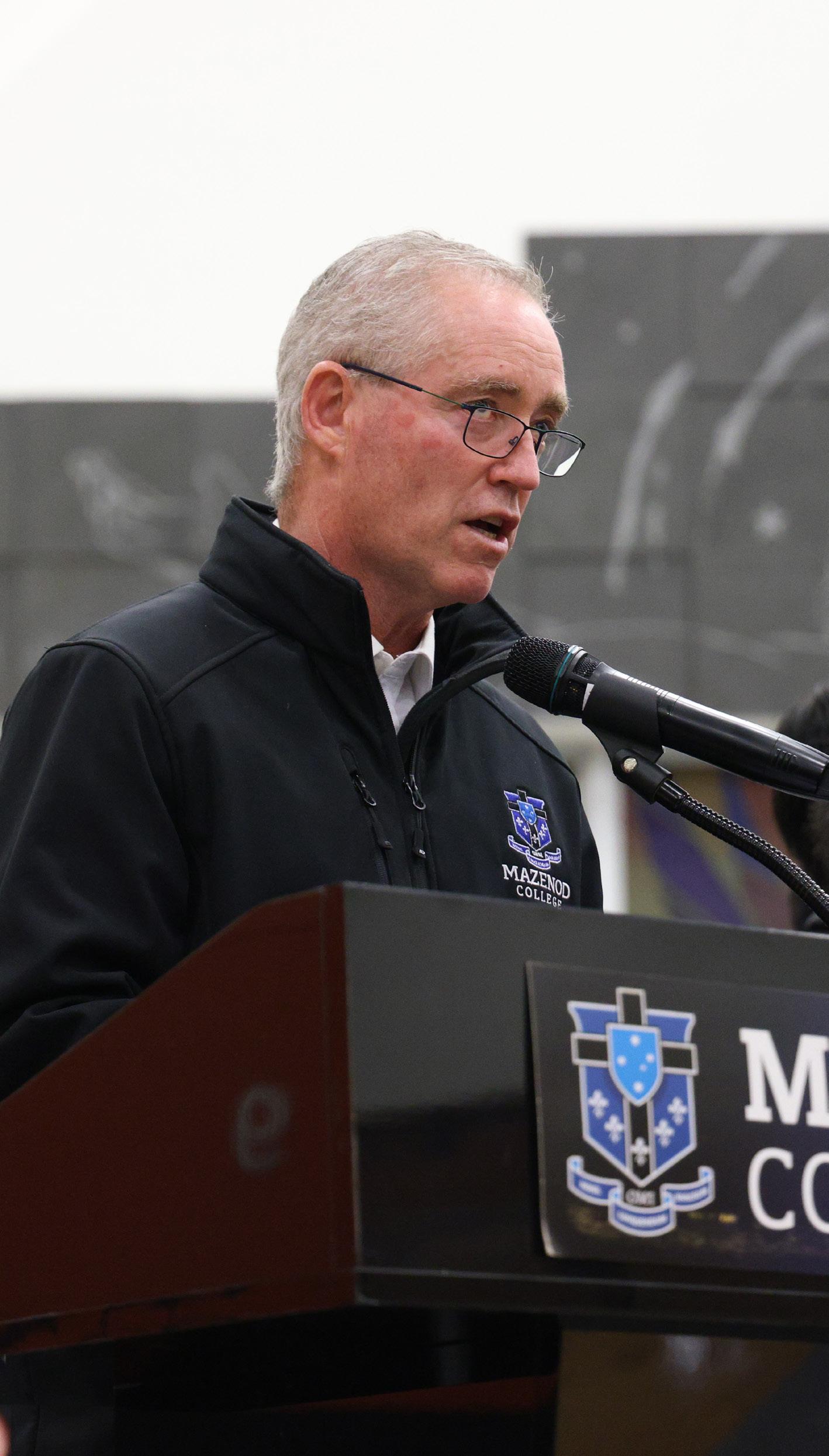

Mazenod College is a vibrant Catholic Secondary College for young men in the Southeast suburbs of Melbourne. It is a College that is proudly founded upon and has a commitment to the tradition of the Catholic Church witnessed through the charism of St Eugene de Mazenod.
Parents and guardians who choose this College for the education of their son or sons are in no doubt that these elements are the core foundations of the College and are what they aspire for their son/s.
Our College community strives to promote the spiritual, intellectual, social, cultural, and physical growth of each person through which they live the Good News of Jesus Christ.
The curriculum and experiential opportunities are in line with these values and are carefully planned and prepared throughout the year. Involvement in these opportunities is a call for our staff to assist the young men entrusted to their formation to transform social realities through the power of the gospel message.
Celebrations of important religious feast days in the Christian calendar, participating in the Sacraments, especially the Eucharist, Retreat and Reflection days combined with our own Oblate celebrations keep the Christian faith in the fore front of our College life.
Our social justice activities of Rosies Street Mission, Vinnies Winter Appeal/Sleepout, Aged Care Visitation, and Oblate Mission Action Day are a reminder of our preferential option for the poor and vulnerable.
Our religious and social activities shine light on the reality that every person is created and loved by God, and saved in Jesus Christ, as they fulfill their personal mission through creating a network of multiple relationships of love, justice, and solidarity with other persons. The “Good News” of love, justice, and peace, are needed more than ever in today's world, devastated as it is by wars, poverty, and injustices.
The identity, vocation and the destiny of the human person aims at promoting the quality of life in solidarity with those who are most vulnerable in accordance with the plan of God, who does not fail to show his love and care for all his children.
Our College aims to empower individuals through a holistic Education, Mission, Vision, and Values to live lives that are an expression of our Catholic faith within the charism of St Eugene de Mazenod for the betterment of society.

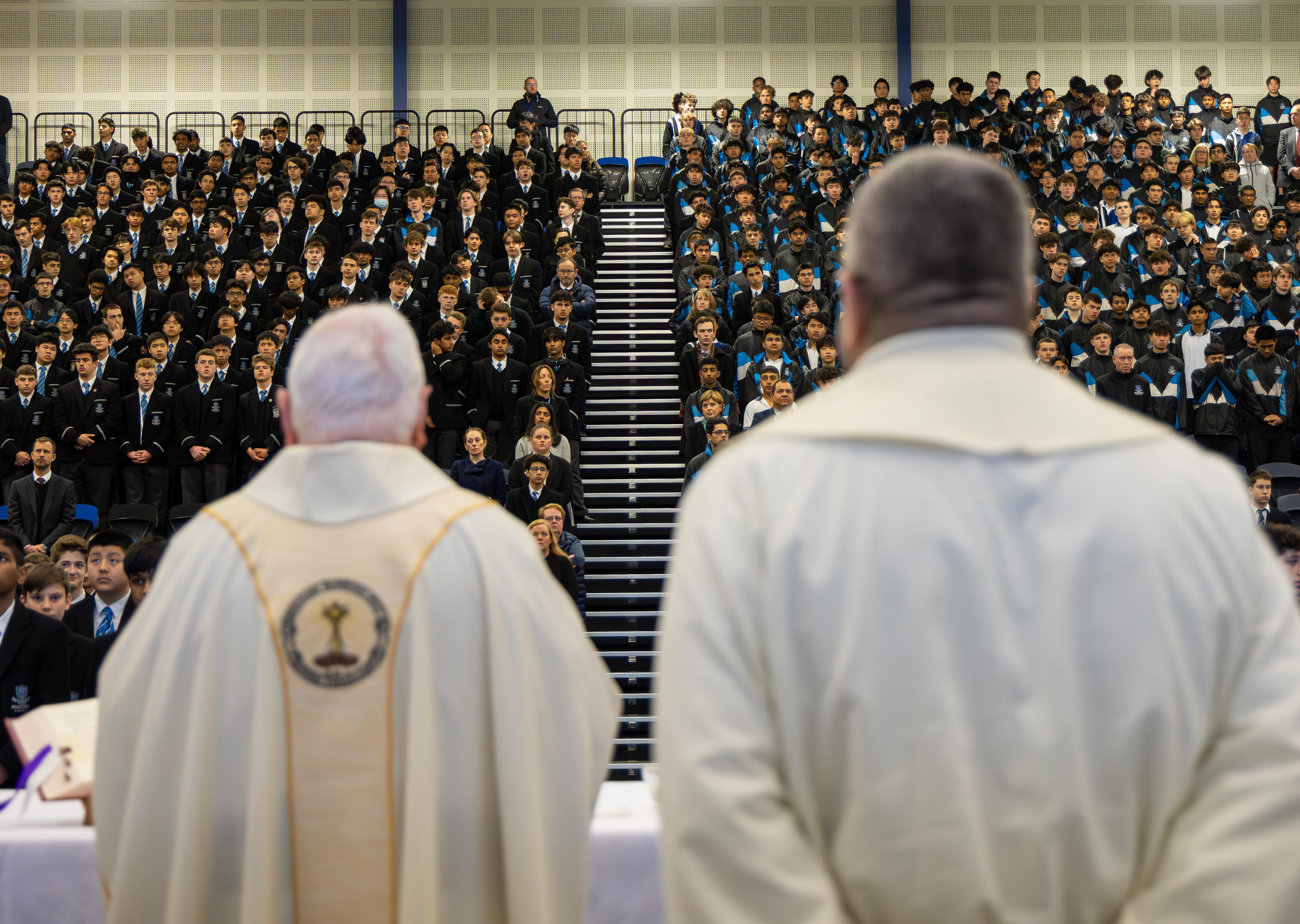

Mazenod College takes its name from St Eugene de Mazenod, founder of the Missionary Oblates of Mary Immaculate. It is a Regional College administered under the Melbourne Archdiocese Catholic Schools Ltd (MACS) who work collaboratively with the Oblates who continue to exercise administrative and pastoral care to provide holistic Catholic Education. The School Advisory Council provides a crucial point of connection between the wider school community and school leaders. The College motto is to ‘Leave Nothing Undared for the Kingdom of God.’
Mazenod College is a Catholic boys’ secondary school striving to live the charism of St Eugene de Mazenod. Centred on the person of Jesus Christ, our community is built on faith, nourished by the Eucharist, and seeks to live and share Gospel values in word and deed.
To Leave Nothing Undared for the Kingdom of God by being people who value learning and service. To acknowledge the owners of the land, care for the gift of creation and embrace the spirit of inclusion for all who work and study at Mazenod College.
“Enter to Learn, Leave to Serve” is the focus of our Catholic Education at Mazenod College, aiming to develop young men who are emotionally intelligent, respectful, well-balanced, committed, articulate, and equipped to make a difference in our society as they respond to the needs of others in answer to Jesus’ call to serve.
Mazenod College is a Catholic Secondary College for boys located in Mulgrave. The College was established to serve the growing parishes in the suburbs of Clayton, Springvale and Glen Waverley in Melbourne’s South East. The College, served by the religious congregation called the Missionary Oblates of Mary Immaculate, is named after the founder of the Oblate Order, St Eugene de Mazenod.
The College commenced in February 1967 with 79 students in 2 modest classrooms at St Joseph’s Primary School in Springvale. In 1968 the school moved to its current location in Kernot Avenue and today we provide quality education to over 1400 students. With little to no funding from government, those early years proved challenging, and the College was reliant on the parishes, the Oblates, and parents, to help support the school.

With much goodwill and hard work the foundation of the College was forged and it is through their generous efforts that the College developed from those pioneering years.
In 2021 Fr Harry Dyer OMI was appointed Rector of Mazenod College under the new model of leadership. A new College Advisory Board was also appointed the same year. Dr Paul Shannon was appointed as the second lay Princpal in 2021 and the opening of the new staffroom in 2022 was enjoyed by all staff.
As the ever-expanding College continues to move forward, it is important to reflect on the vision of those that came before us. Their dedication, hard work and belief in the College reflect the tradition of sacrifice, heroic faith and generosity. Mazenod has strived to reproduce these virtues in every generation since its humble beginnings.
Eugene de Mazenod was born into a noble family of Aix-en-Provence in southern France in 1782.
The family had to flee the French Revolution when Eugene was only eight years old, and for the next twelve years often in poverty and difficulties, they were refugees throughout Italy and Sicily. During that time, his parents separated and were never to live together again.
In 1802 Eugene returned from exile to France and heartily embraced a frivolous social life. However, on Good Friday 1807, before the crucifix in a church in Aix, the young man experienced a profound conversion that made him understand the spiritual and material plight of France and of the Church. He decided to do something about it. Within a year he entered the seminary and was ordained in 1811.
Father de Mazenod set about rebuilding a world of Christian values. From village to village he preached with passion, tirelessly bringing the Word of God and the sacraments to all, visiting prisoners and offering the poor a renewed sense of dignity. In 1816 other priests, inspired by his vision and energy, joined him. In 1826 a new religious family, the Missionary Oblates of Mary Immaculate, was formally approved by Pope Leo XII.
Appointed Bishop of Marseille, de Mazenod set about renewing and uplifting the diocese. All the while he sent his growing corps of Oblates to mission in Canada, Sri Lanka, South Africa and in various parts of Europe. The Missionary Oblates of Mary Immaculate arrived on Australian shores in Fremantle, Western Australia from Ireland in 1894.
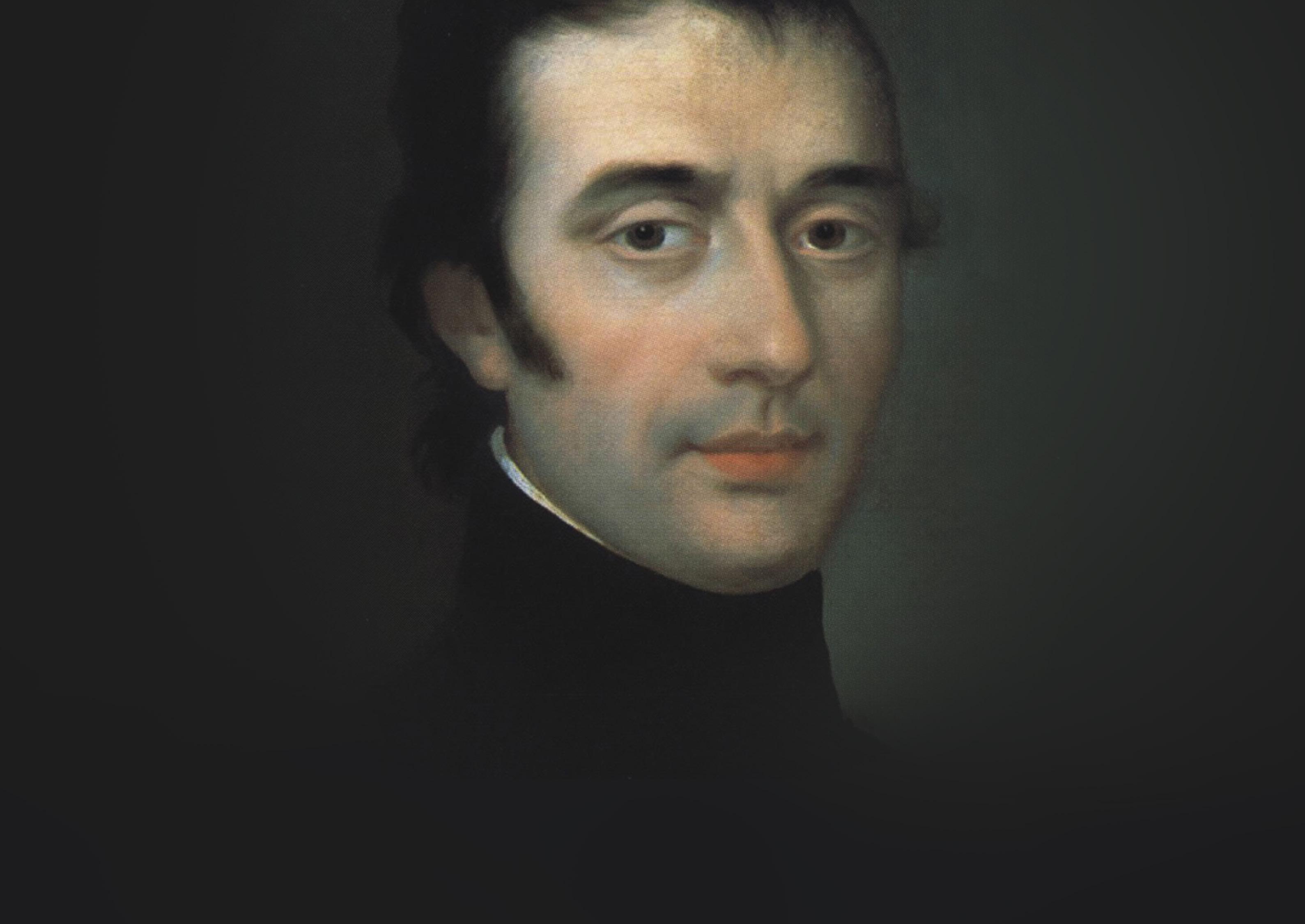
Rich in grace, Eugene de Mazenod died on May 21, 1861.
The Church recognized his life of dedication and virtue when, on December 3, 1995, Pope John Paul II officially declared him a saint.
Moved by Saint Eugene de Mazenod’s inspiration, more than 4,000 Oblate priests and brothers, supported by many Oblate Lay Associates, continue to mission on every continent of the world. His charism lives on in them.
Year 7
Our motto encapsulates a spirit of bold commitment to the divine. In Latin, it reads "Nihil linquendum inausum," prominently featured in the College Crest. This mantra inspires students, to fearlessly embrace challenges and actively contribute to the greater good, fostering a sense of purpose and dedication to their faith and community.
Year 8
We seek to develop a personal relationship with Jesus Christ, the Saviour, and to see people and the world through His eyes. By regularly turning our hearts and minds to Him, and by opening ourselves to the gift of the Holy Spirit, we seek, like Mary Immaculate, to receive God’s holiness and bring it to reality in our daily lives.
Year 9
We serve to light the fire inside our students, fostering a burning desire to achieve academic excellence and to cultivate their abilities to the fullest. We see education as a lifelong process of formation in the truth, not just a moment in time, encouraging our students to be the flame, continuously burning brightly and sharing their talents.
Year 10

Be a burning flame, not a smoldering wick.
We strive to nurture a friendly and caring school, enabling students to develop a sense of loyalty, solidarity and service. We provide pastoral care and encourage participation in all aspects of College life. Nourished by the Eucharist, and led by the Oblates of Mary Immaculate, we believe that once a student enters the College, he and his family become part of our community for life.
Year 11
Learn who you are in the eyes of God.
We aspire to instil in all people the knowledge that God’s unconditional love is real and everlasting. Through the creation of an inclusive community and an environment that is conducive to students discerning their unique worth in the eyes of God, all members of the Mazenod family are free to flourish and grow.
Year 12
Enter to Learn. Leave to Serve.
We endeavour to emulate St Eugene de Mazenod’s model of standing with the poor in our community and beyond. Acts of service are a key component of an education at Mazenod College. On their journey, our students recognise their call to bring the transforming presence of Christ to the world.








The Mazenod College community are organised into eight Houses. These Houses are named after outstanding Catholics who have been ‘Heroes’ in the practice of their faith.
Fr Charles Albini OMI (1790-1839)
Born in Italy, 26th November 1790, he is known as the apostle of Corsica where he spent his life educating men for the priesthood and preaching Missions.
Br Anthony Kowalczyk OMI (1866-1947)
Born in Poland but spent most of his religious life working near Edmonton, Canada. He was a man of great Faith and prepared to work at whatever he was requested to do by his superiors. He was known for his devotion to the Blessed Mother of God.
Blessed Joseph Cebula OMI (1902-1941)
Born in Poland, 23rd March 1902. During World War II the Fascists prohibited him from ministering the sacraments. By day he was forced into hard labour, but at night he said Mass and ministered the sacraments. He was executed by Nazi soldiers in a concentration camp at Mauthausen on 28th April 1941.
Bishop Ovide Charlebois (1862-1933)
Ovide Charlebois was born in Oka in Canada on 17th February, 1862 and at the age of twenty entered the Oblate novitiate. In 1887 he was ordained a priest and sent to the Missions of the west. For sixteen years he lived alone at Cumberland working amongst the Indians. Named Vicar Apostolic of Keewatian in 1910, he laboured at the difficult task organising his vast vicariate with humble yet indomitable patience and courage until he died a holy death on the 20th November 1933.
Caroline Chisholm (1808-1877)
Born 30th May 1808. Caroline migrated to Australia and was known for her work with young migrant women seeking employment. She is an example of a Catholic lay person responding in a heroic manner to help people in need.
Blessed Joseph Gerard (1831-1914)
The saint of Southern Africa. As a young Oblate he arrived in South Africa in 1853. After experiencing failure in his Mission among the Zulu people, he was successful in establishing the Church in Lesotho.
Bishop Vital Grandin (1829-1902)
Born in France in 1829. In 1854 he was sent to work in Canada and at the age of 28 was made Bishop of St Albert (now the Archdiocese of Edmonton). His career of priestly and humble charity was wholly devoted to the Indians. The Indians said of him “If God is as kind as the Bishop, he must be a very kind God.”
Blessed Mary MacKillop (1842-1909)
The first Australian saint was born in Melbourne, 15th January 1842 and died 8th August 1909. Mary was the apostle of Catholic education especially for children in the outback and those who were poor. She founded the Sisters of St Joseph.



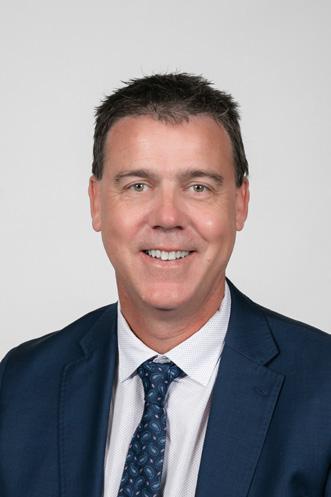


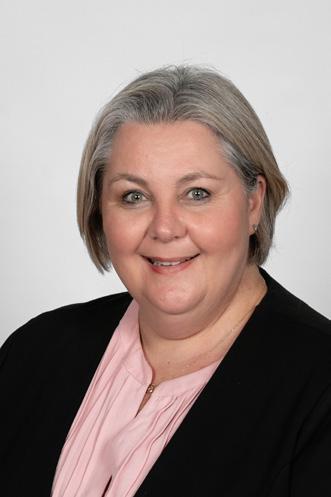
Matthew
The College Leadership Team supports the Principal and Rector in overseeing the operational needs of the College. The team meets weekly to forward plan, review the previous week and discuss matters related to the operational needs of the College. Fellow team members include the Vice Principal, three Deputy Principals, the Director of Learning Diversity, Director of Faith and Oblate Charism, and Director of Business Operations.


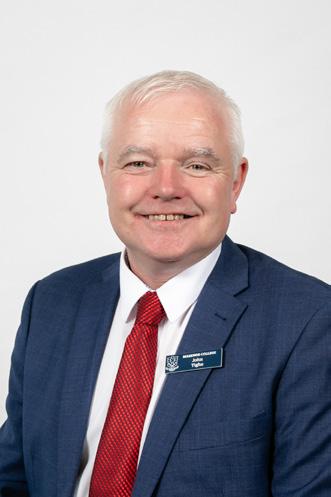
The Consultative Committee is comprised of the Principal, two Principal nominees, two Union nominees and two nominees elected by the staff. Consultative Committee meet once a Term and provide recommendations on class sizes, scheduled class time, staff workloads, communication protocols and positions of leadership. All staff are notified of upcoming meetings and have the opportunity to suggest agenda items and subsequent minutes are available on MazCom.
Membership of the Curriculum Committee consists of the Deputy Principal (Learning & Teaching), Faculty Heads, VCE Administration and Exams Coordinator, VET and VCAL Coordinators, Head of Library, Dean of Learning Diversity, Dean of Data & Learning Technology, and the Dean of Studies. This committee is the forum for all matters pertaining to Learning and Teaching, curriculum processes, examinations, reports, and digital learning.
The ICT Leadership Teams consist of four complementary groups:
• ICT Management – dealing with operational functions, projects, and financing
• ICT Leadership – dealing with strategic planning, technology initiatives, student and faculty IT, and cyber security
• Data, Systems, and Analysis Team – dealing with data management and storage
• Digital Pedagogies – dealing with matters of learning and teaching using ICT, putting strategic plans into action
Staff are encouraged to approach the Director of ICT, Ashley Voigt or the Dean of Data and Learning Technology, Alex Borlenghi if they have any questions or suggestions for the way in which ICT is managed at the College.
This committee meets to ensure that “at risk” students are protected and cared for. The committee consists of the Dean of Senior School, Dean of Junior School, the College Psychologists, Learning Diversity staff, College Nurses, and is chaired by the Deputy Principal (Students).
The Occupational Health and Safety Act 2004 sets out the rights and obligations of the employer, employee and the Occupational Health and Safety Representative. The basis of the Act is to develop a consultative process between the employer and the employee to secure a safe and healthy working environment.
It is the responsibility of all staff to work towards a safe and healthy workplace and as a result Mazenod College complies with all Worksafe standards and requirements, completing documents such as Near Miss and Hazard Report forms.
The committee meets once a month and works through any issues that are presented by staff, students or parents. All matters raised are treated confidentially and with the utmost respect and acted upon promptly if the need or concern is of a serious nature. Contacting any member of the committee can be via letter or email, or in person, however, it is essential that the information is documented. Currently, the OH&S Committee is chaired by Maree Martin and comprises of Sue Matthews, Marc Johnson and Tony Rolfe.
Staff are encouraged to join the Mazenod College Staff Association. The Staff Association provide the following to members:
• Tea Room facilities such as Tea/Coffee/Sugar
• Special Morning Teas throughout the yearActivities
• End of Year Christmas Function (Free for full paying members, pro rata members may be required to pay extra for this)
• Flowers, farewell gifts and thankyou gifts throughout the year
A stocked drinks fridge awaits at the end of each week. For full time staff this is $10 per fortnight, part time staff this is calculated based on your FTE (for example, if your FTE is 0.8, then the rate is calculated as $8). This is automatically deducted from your fortnightly salary. Please see the Business Manager if you wish to discuss your options with payment.
Your IEU Union Representative is Carolyn Gekas. Please reach out to Carolyn if you have any questions regarding membership or services the Union provides. Your membership can also be deducted from your salary, once official notification is received from IEU.
MazCom, our innovative digital learning management system, is designed to empower our students' education. This will be your primary hub for learning resources, calendars, timetables, reports, links to services, forms and much more.
For any assistance with MazCom, you can contact the LMS Coordinator.
Please note, there are different views for parents, students, and staff, with varying amounts of access to different pages and functionality.
In addition to the MazCom website, a MazCom app is available for your smart phone or tablet. This is available from either the Apple Store or Google Play store. The app acts as a 'lite' version for MazCom, and also enables quick access to the full MazCom site from your phone.

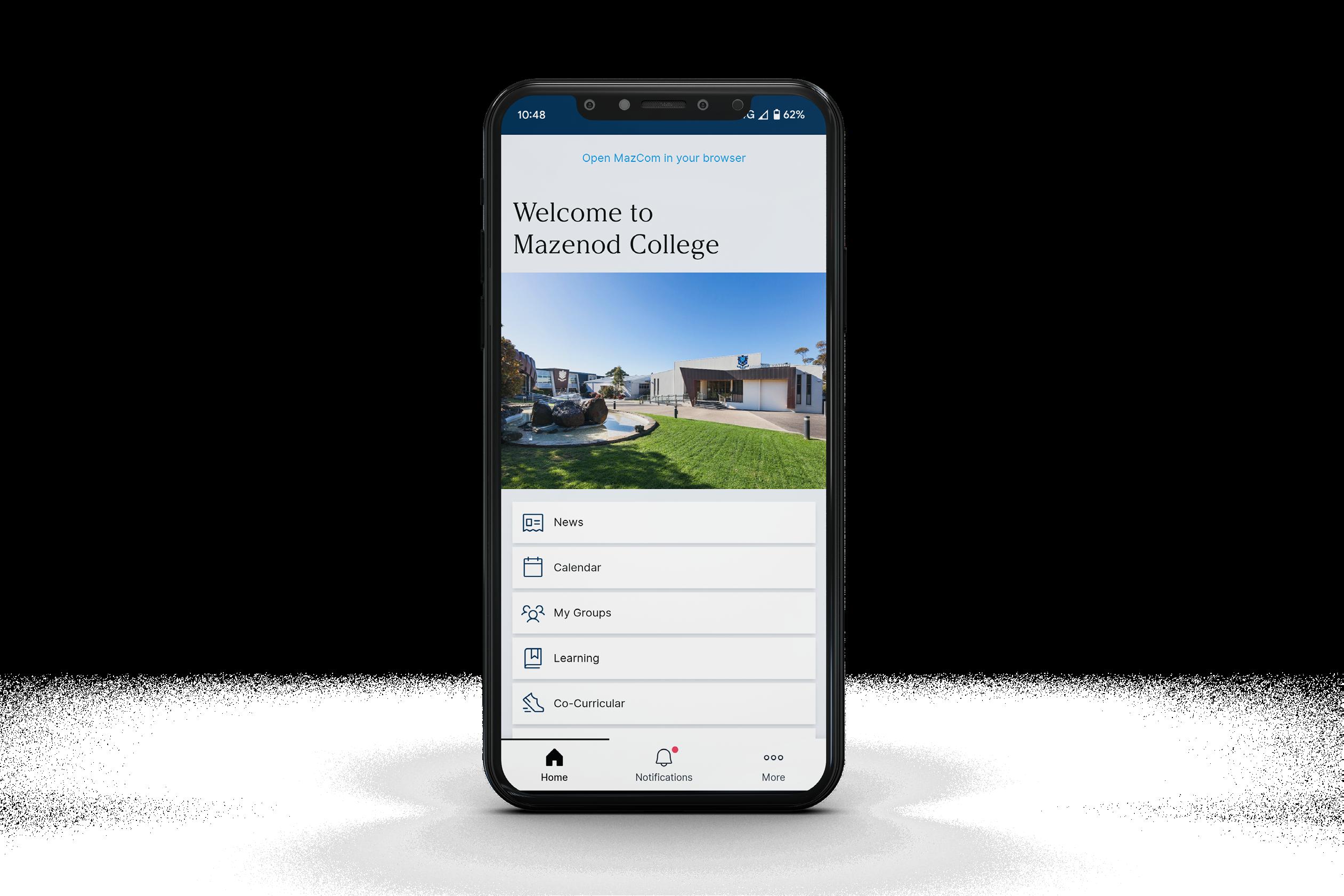



Toolbar
Quickly access the major feature sets within MazCom.
Menu
The main menu, linking to pages within the MazCom tree.
Quicklinks
External services that Mazenod College staff frequently utilise.
Groups
Pastoral Groups, class pages, College teams and more can be saved here for quick access.
Classes
Your timetable of classes for the day.
Yard Duty
Your yard duty roster for the day.
News
Here you will find the most recent news articles posted by staff.
Prayer
Each day, the Liturgy & Prayer
Coordinator cites a prayer for you to read. You may wish to begin Pastoral Group with this prayer.
Calendar
A summary of College events on this day in the calendar.
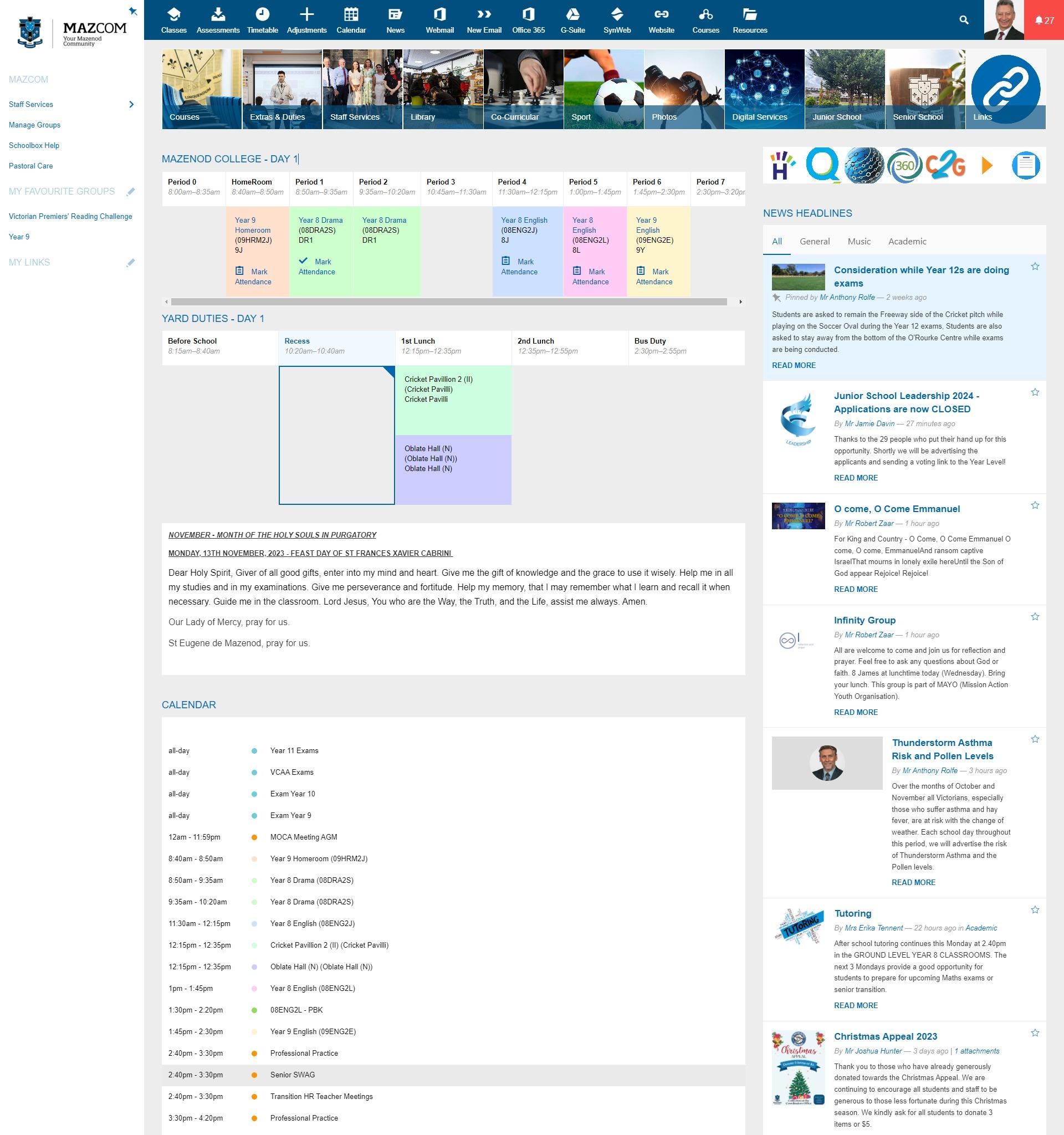

Rationale
This policy outlines Mazenod College’s commitment to the creation of a safe, tolerant and disciplined environment within which young people prepare to be active and reflective Australian citizens with a disposition to life-long learning. They will be able to participate in and shape community and economic life in Victoria and the nation. They will be able to engage confidently with other cultures at home and abroad.
Aim
In accordance with the ethos and philosophy of Mazenod College, staff members will adhere to the following:
Commitment to Students
• Recognise and promote the understanding of diversity.
• Provide an environment which promotes the physical, emotional, social, intellectual and spiritual wellbeing of all students.
• Develop appropriate relationships with students.
• Base teaching on best practice and individual needs.
• Work within one’s expertise.
• Protect the student’s right to privacy and confidentiality.
Responsibilities to Parents/Guardians and Families of Students
• Establish a relationship based on courtesy, mutual trust, and open communication.
• Respect family privacy and treat information with an appropriate level of confidentiality.
• Respect parents’ and guardians’ rights of enquiry, consultation, and information regarding their children.
• Respect the uniqueness and characteristics of each student’s family background.
Commitment to Colleagues and to the Teaching Profession
• Build an atmosphere of trust, mutual respect, and candour.
• Act within the educational and wider community in a way which enhances the status of the profession.
• Update and improve effective learning and teaching strategies.
• Assist newcomers to the profession.
Responsibilities to the Community and Society
• Provide students with a positive role model.
• Promote co-operation among all agencies and professionals working in the best interest of students and families.
Responsibilities to Mazenod College
• Provide a high standard of professional service through active participation in the activities of Mazenod College.
• Promote and actively contribute to Mazenod College philosophy and culture.
• Observe contractual commitments.
• Develop by precept and example, a respect for laws and policies which protect and promote the wellbeing of students, families, and the community.
Read the full Staff Code of Conduct Policy: https://mazcom.mazenod.vic.edu.au/send.php?id=73718
Rationale
Mazenod College (the School) recognises the importance of demonstrating respect for the dignity of each person and of creating an environment where a sense of belonging for all is experienced. These aspirations are central to the wellbeing of individual staff and to a workplace where all staff feel safe and respected.
The School is therefore committed to building and nurturing a workplace that is free from discrimination, sexual harassment and victimisation. It is important that all staff share a responsibility for upholding professional standards of conduct and for building and nurturing a workplace where discrimination, sexual harassment and victimisation do not occur. It is therefore expected that staff will desist from engaging in or condoning such behaviours and practices.
It is also expected that staff who make a complaint, or who may be witnesses to circumstances giving rise to a complaint, will participate fully and confidentially in any investigation and resolution procedures.
This policy and its accompanying procedures are compliant with the legislative framework under which the School operates. The School is guided by the applicable legislation in determining its prevention and intervention measures.
Read the full Workplace Equal Opportunity Policy https://mazcom.mazenod.vic.edu.au/send.php?id=73313

You can view all of the College's Policies and Procedures on MazCom or the Mazenod College Website.
MazCom > Staff Services > Policies mazenod.vic.edu.au/about-us/policies
Staff are given leave entitlements under the Victorian Catholic Education Multi-Enterprise Agreement (VCEMEA, or ‘The Agreement’).
Please contact the Human Resources and Policy Manager gpargeter@mazenod.vic.edu.au for more information regarding leave entitlements available to staff including:
• Annual leave
• Sick leave (including carer’s leave)
• Long service leave
• Parental leave
• Personal leave
• Bereavement leave
• Graduation and Examination leave
• Leave without pay
Staff intending to take leave must apply online through EMS 360.
On days when you are absent the Daily Organiser needs to know as soon as possible. You must contact the College before 7:00AM (the earlier, the better) and leave a message on the Daily Organiser’s mobile phone or email cwindley@mazenod.vic.edu. au. The mobile contact number is located on the Daily Org. sheet.
Work can be left for students via MazCom. See the ‘Extras & Duties’ tile on your homepage. Each teacher has been issued a folder in which details of work to be completed can be left. You are also encouraged to place details on your class page.
On weekdays the College is open to staff from 6:00AM to 9:00PM via your personal security card. If you leave the premises during school hours, please sign out at Reception. Educational Support Officers have individualised working hours, dependant upon the role in which they have been employed.
Office hours are Monday - Friday, 8:00AM – 4:30PM.
Using the 30:8 EBA model, teacher hours are as follows:
Monday: 8:30AM – 4:20PM
Tuesday: 8:30AM – 4:20PM
Wednesday: 8:00AM – 3:30PM
Thursday: 8:30AM – 4:20PM
Friday: 8:30AM – 3:30PM
Grounds and Maintenance 7:30AM – 4:00PM
Office and Administration 8:00AM – 4:30PM
Sports Administration 8:30AM – 4:30PM
IT Support 8:00AM – 4:30PM
Audiovisual Technician 8:00AM – 4:00PM
Library Technicians 8:00AM – 4:00PM
Learning Support Officers 8:00AM – 4:00PM
Laboratory Technicians 8:00AM – 4:00PM
Community Liaison 4:00PM – 10:00PM
Nurses 8:30AM - 4:00PM
Attendance and participation in College events is expected. These include:
• Inaugural Mass
• Night of Excellence
• College Open Days
• Founders' Day Mass
• Parent Teacher Interviews
Additionally, it is anticipated that staff will contribute to and support the College’s extracurricular programs, including the:
• Outdoor Education Program
• College Retreats Programs
• Camp Program
• Mission Action Day
• Community Service initiatives of the College including Rosies
The College maintains records for time-in-lieu in compliance with the EBA.
The College encourages all staff to maintain currency of knowledge and practice through regular professional learning (PL). While Faculty Heads and the Dean of Professional Learning will recommend PL opportunities, staff are welcome to seek out and apply for PL themselves. The process for this is as such:
1. Check with your faculty head or line manager that the PL is appropriate
2. Enter a professional development request through EMS360 (under MY EMS>Add Event Request)
3. You will be informed by automated email If permission is granted
4. After receiving permission, proceed to register for the PL. Where possible, seek payment by invoice, using the date as a purchase order number.
Staff are encouraged to make bookings for various College facilities through MazCom (under ‘Facility Bookings’).
Weights Room, Oblate Hall and Provence Centre
Student use of the Oblate Hall, Charles Anag Fitness Centre or Provence Centre sporting halls is only permitted if they are accompanied by a teacher.
Theatre
Seating Capacity: One Year Level
As it is an outstanding resource, which needs to be well maintained, student behaviour needs to be closely supervised. Senior school students are usually given preference in its use.
The Cafeteria accommodates Year 12 students at lunchtime. It is attached to the canteen. Staff can purchase their lunch as required from the canteen.
The College requires staff to dress professionally as outlined below.
Working Days - Teaching and Education Support Staff
Staff are expected to wear neat, professional and appropriate clothing for the duties they will be performing. In general, all male staff are expected to wear a collared shirt and tie, with female staff required to dress in an equivalent standard of attire. Staff are reminded that thongs, sleeveless tops, hoodies, beanies and revealing items are not appropriate. The Principal reserves the right to have the final say on what is appropriate regarding attire, hair colour, tattoos and piercings etc.
The safety and care of all staff is paramount at Mazenod College and as a result guidelines are provided for the wearing of appropriate footwear:
• All staff are recommended to wear closed toe shoes when onsite.
• If staff are using machinery, or in a workshop, they are advised to wear protective footwear such as steel cap boots or shoes.
• Staff who work predominantly in laboratories, kitchens, or any other areas where there may be moisture or wet areas are advised to wear the appropriate rubber, nonslip soled footwear.
• If working in an area where there is the possibility of a chemical spill, (science labs, maintenance or in workshop situations) perforated shoes, sandals, or cloth sneakers are NOT to be worn as they provide no barrier between you and chemical and physical hazards.
If staff are not sure of the appropriate footwear, please speak with your immediate line manager or the Dean of Staff.
Staff dress requirements are clean, tidy and neat casual, keeping in mind that professional standards need to be maintained. As a guide: no thongs, no singlets and no ripped jeans.
The College prescribed uniform should be worn.
Staff with a timetabled sports allocation are permitted to attend school in the official Mazenod branded tracksuit (pants and jacket) and polo shirt, which will be supplied. This applies only on days on which those staff have a timetabled sports. Please note that no other sports wear (non-Mazenod branded) should be worn to school.
All staff will be provided with a College Staff polo shirt and are encouraged to purchase approved College Staff attire.
On formal occasions staff are required to dress appropriately –“jacket and tie” or equivalent.
Professional dress standards apply, determined by the activity. If students wear their blazer and tie, staff standards should also reflect the occasion. If students are in sports uniform then staff dress will need to dress accordingly.
Every staff member has access to the following when communicating to students, parents or other staff members:
• A Mazenod College email address - staff are required to check their inbox daily
• An office telephone - a list of staff telephone numbers can be found in MazCom under ‘Staff Services’
• Each staff member has a voice message programmed on their office telephone and is advised to regularly check these messages. If staff require assistance setting up their voice messages, they should contact the AV Technician. Telephone messages will not be taken at Reception unless they are extremely urgent
• All staff have access to Microsoft Teams as the preferred method of communicating, sharing files and collaborating.
• MazCom - staff can search for specific members of the College community including other staff, students or parents. Individual or group messages can be sent via MazCom
A weekly bulletin will be sent to all staff on Friday afternoon to plan for the following week. This includes relevant information from all members of the College Leadership Team.
On each Wednesday there is a compulsory staff briefing held online scheduled for 8:10am. This meeting is a general forum to outline all the major happenings of that week and to build our sense of community. All staff are expected to attend this online gathering and information sharing session. This excludes part time staff who do not work on Wednesday mornings. Briefing minutes can be found under the 'Staff Information' tile on MazCom. Once per term, a breakfast briefing will be held in the College staffroom.
A full meeting schedule can be found in the Staff Information tile on MazCom. The College monitors all staff meeting hours to ensure compliance with the EBA.
Verbal:
Staff are to use first names when communicating with each other and full names (Fr/Mr/Dr/Ms/Mrs/Miss Surname) in front of students.
Email:
• Consider whether an email is appropriate when face-to-face communication may be more conducive
• Avoid exclusive email correspondence without requesting or organising a face-to-face meeting
• Avoid sending to all staff or using 'reply all' unless necessary
• Copy in line managers
• Keep emails concise, use Standard English and bullet points if necessary
• Check emails daily
• Use group emails as appropriate.
• Use Microsoft Teams to collaborate with team members
• Staff should not send emails before 7am or after 7pm (Monday-Friday). Emails should instead be saved as drafts and sent during work hours
The best way to communicate with a large number of students over a variety of classes is through the MazCom Newsfeed. These announcements are read by students at the begining of each day. Messages for individuals, groups, classes or year levels all find their way into the Newsfeed. All staff can submit items electronically in MazCom by following the prompts.
Emails to parents of individual students or classes should be sent via your staff email. Similarly, phone calls to parents should be conducted during College business hours using your assigned office telephone. Staff are highly encouraged to call privately (hide their caller ID) if using their personal mobile phone to contact parents. All contact information of parents of students can be found on MazCom, Synergetic or SynWeb. If staff notice any incorrect or outdated information they should advise the administration team.
Students are expected to utilise their student diary. Staff can write notes to home in student diaries and expect parents to acknowledge the note with a signature.
Parents have access to MazCom through their own unique login username and password. Parents can access their child’s class pages, view reports and see assessment results. Staff can communicate to parents via the News Headlines or by the message facility.
Written letters (via post) or electronic attachments (via email) can also be sent to parents for class activities, excursions, invitations to functions, year-level or school-wide communications and other College related initatives. Approval must be sought from Administration (and/or the Principal), who will also handle the distribution of your letters. All communication must be sent on the College letterhead (templates can be found on MazCom) and adhere to the College branding rules.
The newsletter acts as a unifying force in the College community and is emailed fortnightly, internally and externally, in order to keep everyone informed of College activities and news. Students are also excited to see if the school community has acknowledged their particular activity. It is important to submit articles to newsletter@mazenod.vic.edu.au prior to 4pm on Wednesday. Staff in Positions of Leadership, including Faculty Heads and members of the College Leadership Team, are allocated an Issue each year in which they will write an article for the newsletter.
Mazenod College recognises the importance of demonstrating respect for the dignity of each person and creating an environment where a sense of belonging for all is experienced. These aspirations are central to the wellbeing of individual staff and to a school where all staff feel safe and respected.
Staff Wellbeing Mission Statement
Mazenod College recognises that a healthy, safe, and supportive working environment can positively affect the mental wellbeing of employees. We will create and maintain positive work cultures that promote connectedness, are inclusive, share responsibilities and provide support. We will treat all individuals with respect, equality and openness. We will reduce or remove economic or social barriers to employees’ participation in personal and school development opportunities.
For further details, please see the Staff Wellbeing Policy on MazCom.
Grievances are treated seriously by the College. Grievances or complaints should be reported immediately. In accordance with the principle of subsidiarity, the College provides a graduated series of steps designed to resolve the matter in the most appropriate way at the lowest possible level. The purpose of these grievance procedures is to provide clear, positive and fair processes that allow grievances to be aired and resolved in a timely and effective manner.
Refer to the Grievances Policy for more information.
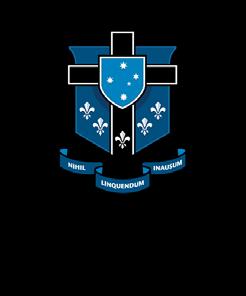

Every day begins with a voluntary Mass in the chapel at 8:10AM. Morning Yard Duty commences at 8:15AM.
Please Note:
Each Monday school concludes at 2:30PM. This allows time for Professional Practice, meeting with your teaching team or corrections etc.
Full College assemblies occur on Fridays. Please refer to the appropriate times in the Bell Time schedule. On the day of a Full College assembly, students will meet in their Pastoral Group for roll-calling and will be called to The Provence Centre over the PA system.
All teachers and students are expected to attend. A team of staff and student leaders organise the agenda for assemblies and this agenda is then submitted to the Deputy Principal (Students) for approval.
During the extended pastoral time on Fridays, a range of activities will occur based on the published Friday Schedule. This will include a combination of wellbeing lessons, year level assemblies, sub-school assemblies, and other pastoral activities (surveys, subject selection, guest speaker etc.).
Monday Schedule
Bell Rings 08:35 AM
Pastoral Group 08:40 AM - 08:50 AM
Period 1 08:50 AM - 09:35 AM
Period 2 09:35 AM - 10:20 AM
Recess 10:20 AM - 10:40 AM
Period 3 10:45 AM - 11:30 AM
Period 4 11:30 AM - 12:15 PM
Lunch 12:15 PM - 12:55 PM
Period 5 1:00 PM - 1:45 PM
Period 6 1:45 PM - 2:30 PM
Friday Pastoral Group and
Year Level Assembly Schedule
Bell Rings 08:35 AM
Pastoral Group 08:40 AM - 09:20 AM
Period 1 09:25 AM - 10:10 AM
Period 2 10:10 AM - 10:55 AM
Recess 10:55 AM - 11:15 AM
Period 3 11:20 AM - 12:05 PM
Period 4
Normal Schedule
Bell Rings 08:35 AM
Pastoral Group 08:40 AM - 08:50 AM
Period 1 08:50 AM - 09:40 AM
Period 2 09:40 AM - 10:30 AM
Recess 10:30 AM - 10:50 AM
Period 3 10:55 AM - 11:45 AM
Period 4 11:45 AM - 12:35 PM
Lunch 12:35 PM - 1:25 PM
Period 5 1:30 PM - 2:20 PM
Period 6 2:20 PM - 3:10 PM
Full College Assembly Schedule
Bell Rings 08:35 AM
Assembly 08:40 AM - 09:55 AM
6

The Oblate Priests serve the pastoral needs of the Mazenod College community. Central to this fact is the celebration of Mass. This occurs on a daily basis commencing at 8:10AM Monday - Friday.
Year levels are allocated a specific day of the week:
Monday: Year 7
Tuesday: Year 8
Wednesday: Year 9
Thursday: Year 10
Friday: Years 11 - 12
Students are given the responsibility for preparing the Mass and Pastoral Leaders should encourage their Pastoral Group to be present. This encouragement becomes a lot more meaningful when the Pastoral Leader is also present at this Mass. All staff are also welcome to participate daily.
The College takes seriously the importance of ongoing staff faith formation and professional learning within an Oblate Catholic context. Each year a staff retreat day is held, usually at the end of Term 3. In addition, two all staff professional learning sessions are conducted throughout the year focusing on the Charism of St Eugene De Mazenod and other important matters of faith and mission.
The Director of Faith and Oblate Charism, and Retreats Coordinator, are responsible for logging these professional learning hours on the Teacher Accreditation Platform (TAP) in CEVN, which leads to teachers gaining and maintaining accreditation to teach in a Catholic school. Attendance at these professional learning events will satisfy the 25 hour requirement.
Those seeking to maintain accreditation to lead or teach RE in a Catholic school should seek additional professional learning through the TAP platform on CEVN. Please apply for these through EMS360 prior to registering on TAP. It is a teacher’s responsibility to check their hours on TAP.
Teachers seeking to gain the accreditation to lead or teach RE should approach the Director of Faith and Oblate Charism to investigate formal education opportunities.

The College has two emergency audible warning signals that require different actions:
1. Lockdown: Signalled by a “beep beep”
2. Evacuation: Signalled by a “whoop whoop”
All procedures for each emergency can be found on MazCom under ‘Displan - Evacuation & Lockdown Information’. Staff are expected to understand the various procedures in the event of an emergency evacuation or lockdown.
An evacuation diagram (such as the example on this page) and assembly areas can be found at entrances and major thoroughfares throughout the school. Please familairse yourself with these diagrams and assembly areas.
Assembly Area 1: Johnson Oval Assembly Area 2: Behind Tennis Courts
The College also conducts regular evacuation drills to prepare staff and students in the event an incident occurs. The date and time of these are decided by the Director of Operations, Risk & Compliance at the beginning of each year.
Parking spots are allocated by a nominated staff member at the beginning of the year. Please ensure that you park in your assigned space and not in another person’s space. Staff who are not allocated a carpark are advised to use parking spots in the Monash Community Centre, that can be accessed via Wellington Road. It is a short walk along the Freeway Reserve pathway to Kernot Avenue and the College. Please do not park in the visitor spaces directly in front of the College entrance on Kernot Avenue.
Visitors are always welcome to the College. All visitors must sign in at Reception prior to entering College grounds, and are required to have either Working With Children's or VIT numbers (except Parents/Guardians).
Guest Speakers are always welcome for meetings or classes. It is essential that you should inform either the Principal, Rector, or a Deputy Principal of your desire to invite a guest and seek approval prior to their arrival.
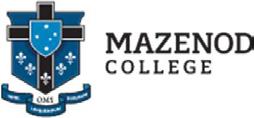



















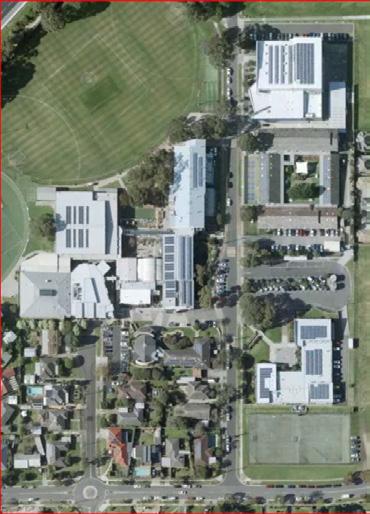


The College has numerous maintenance and grounds-keeping staff members that work during school hours to maintain the upkeep of the various buildings and ovals. The College also has contracted cleaners who maintain the cleanliness of the College grounds.
If staff have a maintenance issue, they can raise a new request from ‘My Maintenance’, the College’s maintenance management system located under Staff Services on MazCom.
The cleaning at Mazenod College is contracted externally. Corridors, classrooms and offices are cleaned regularly. Teachers should ask students to put the chairs up on tables at the end of the day, on Wednesdays and Fridays, to assist with vacuuming.
If there is any particular cleaning issue, please contact Marc Johnson. Please be mindful that the staffroom is a communal space and we are all responsible for maintaining it.
Printing can be organised through the College Print Room or throughout the campus on the print machines.
For larger print volumes, specialised colour printing or printing of booklets and other bound references, please consult the Print Room Manager. Multiple days’ notice to print material is required to ensure that the job can be completed in sufficient time. Email your documents to printroom@mazenod.vic.edu.au
For instructions on using the desk phone including accessing voicemail, dialing internally versus externally, and more, please visit MazCom > Staff Services, under "Staff Training Manuals".
Computer Technicians are available in the Founders’ Complex for advice and support and can be contacted by email or by phone (ext. 1149). The ICT team is more than happy to come and see you, and help with any queries you may have. The College also has a Digital Learning Coach who can spend time with you to assist in how to get more out of the ICT Resources at the College.
Key Contacts:
• IT Support support@mazenod.vic.edu.au
• LMS Coordinator
• Dean of Data & Learning Technology
All access to technologies provided by Mazenod College are intended for education purposes. While making every reasonable effort to ensure safety and security when using technologies (in-house and online), for students and staff, the College is aware that the nature of this resource can provide opportunities for inappropriate use. Please be considerate when using any technologies and online platforms, especially in regards to privacy and copyright. Intentional, unacceptable or irresponsible use of the internet or computer facilities may result in disciplinary action.
Refer to the Responsible Use of Technology Policy for more information.
In accordance with the College Staff Laptop Agreeement, staff should carry their laptops in the bag provided when moving between classes. In the instance of extended leave, staff should return their laptop to the ICT counter prior to departure. This is relevant for leave of a term or longer.
All staff must adhere to the style guidelines and logo requirements as set out in the Brand Guidelines document, available on MazCom.
Staff will also find templates of College letterheads, powerpoints, and more on MazCom to be used when communicating with the wider community.
All communication and publications made on behalf of the College must be approved by the Principal, a Deputy Principal or the Marketing and Communications Coordinator. These include communication or publications via:
• the wider College community
• social media
• websites
The Marketing and Communications Coordinator can also assist in designs and artwork for College publications or communications.
Staff are encouraged to let the Marketing and Communications Coordinator know of events that may be of marketing interest, such as excursions, competitions, displays, interactive learning experiences and staff or student achievements.
Mazenod College staff should refrain from speaking about the College in the media without prior permission. When Mazenod College issues a media release or initiates contact with the media we will nominate individuals who are specifically authorised to talk to the media about the issue at hand. No one else is authorised to speak to the media on behalf of Mazenod College except the nominated spokesperson. When the media approach the College for a story or as part of an investigation, we need to ensure that the right person responds. The staff authorised to speak with the media is the Principal or a nominated spokesperson delegated by the Principal.
You will have already received various induction forms that need to be completed and emailed or returned to the Principal's office.
The College Business Manager is responsible for all staff finances and keeping staff details updated.
Any updates to your personal details, including change of address, contact numbers, emergency contacts, next of kin, or your banking and superannuation details should be forwarded to the College Business Manager smatthews@mazenod.vic.edu.au
Mazenod College pays salaries on a fortnightly basis. This is paid into your nominated bank account by the Friday of that fortnight.
If you have a change in bank details, please notify the Business Manager with the new details no later than COB on the Monday prior to the pay date.
Salaries are set under the current CEMA (2022-2025). There are two 1% rate increases each year, January 1st and July 1st.
Salaries are paid each fortnight over the Christmas holiday period. In December, you also receive a 17.5% holiday loading payment. If you started during the current year, your salary and loading will be calculated pro rata and this will be discussed individually with you prior to the end of the year.
Mazenod College pays the SGL into your nominated superannuation fund. You also have the option to contribute into your super fund, either a before tax deduction (Salary Sacrifice – Super) or after tax deduction. Please contact the Business Manager if you wish to pursue this.
Mazenod College offers staff the opportunity to salary package items such as novated leasing and running costs, credit cards, laptops etc. The College uses two companies, it is up to the staff member to choose which company they wish to utilise:
• Maxxia (maxxia.com.au or 1300 123 23)
• SmartSalary (smartsalary.com.au or 1300 476 278)
Please feel free to talk to the Business Manager if this is something you wish to pursue.
This is the online portal with the Victorian Catholic Education Authority. When you join Catholic Education, you are issued with a unique CNumber and password that you use to access this portal. This will be emailed directly to you from CEVN. Your temporary password included in this email will expire if not activated within the time stipulated in the email. Please change your password to one that you will keep. Your CNumber for your reference is also printed on the top right hand side of your payslip. You can use this portal to check that your personal details are correct such as address, qualifications, emergency contact and next of kin.
You can also view your Personal Leave and LSL entitlements through this portal. Please contact the Business Manager if you have any questions or require assistance accessing this portal.
The Deputy Principal (Staff) oversees the maintenance of valid VIT Registrations.
The Business Manager maintains a database of Working With Children Checks (WWCC) for non-teaching staff. This is monitored monthly to ensure current validity, and reminders are sent to staff whose checks are due for renewal.
All new staff receive a contract that details the requirement to provide VIT registration details (for teachers) and Employee WWCCs and Police checks (for non-teachers).


Heavenly Father, you have chosen us to be your people and you call us to live and grow each day in our Mazenod College community.
COLLEGE PRAYER EXCERPT

At Mazenod College we care deeply about students, staff, and the wider community. We take a zero-tolerance approach to any form of abuse, discrimination, or misconduct. When things may not go as planned, or behaviour may not align with the values of the College, we rely upon individuals to let us know.
MazSAFE is an online platform which allows individuals to voice their concerns when there is the need. Those raising a concern can remain anonymous or can provide their details so that their input can help provide a suitable resolution.
https://mazenod.relyplatform.com/report
Mazenod College has a moral and legal responsibility to create nurturing school environments where children and young people are respected, their voices are heard and they are safe and feel safe. We are committed to the safety and wellbeing of all our students, and ensuring communication with staff, contractors, volunteers to enable them to fulfil their roles.
Mazenod College’s Child Safety Policy takes into account relevant legislative requirements within the state of Victoria, including the specific requirements of the Victorian Child Safe Standards as set out in Ministerial Order No. 1359. The policy applies to school staff, including school employees, volunteers, contractors and clergy.
At Mazenod College, we expect school employees, volunteers, contractors and clergy to proactively ensure the safety of students at all times and to take appropriate action if there are concerns about the safety of any child at the school. All school staff must remain familiar with the relevant laws, the code of conduct, and policies and procedures in relation to child protection and to comply with all requirements. We have developed a Child Safety Code of Conduct, which recognises the critical role that school staff play in protecting the students in our care and establishes clear expectations of school employees, volunteers, contractors and clergy for appropriate behaviour with children in order to safeguard them against abuse and/or neglect.
Our Code also protects school staff through clarification of acceptable and unacceptable behaviour.
All staff, volunteers, contractors, clergy, and board members are responsible for supporting the safety of children by
• Adhering to the school’s child safe policy and upholding the school’s commitment at all times
• Taking all reasonable steps to protect children from abuse
• Treating everyone in the school community with respect
• Listening and responding to the views and concerns of children, particularly if they are telling you that they or another child has been abused or that they are worried about their own safety or the safety of another child
• Promoting the cultural safety, participation and empowerment of Aboriginal and Torres Strait Islander children
• Promoting the cultural safety, participation and empowerment of children with culturally and/or linguistically diverse background (by having a zero tolerance of discrimination)
• Promoting the cultural safety, participation and empowerment of children with a disability
• Ensuring as far as practicable that adults are not alone with a child
• Reporting any allegations of child abuse to the Deputy Principal (Students) and to the College Leadership Team
• Understand and complying with all reporting obligations as they relate to Mandatory Reporting
• Reporting child safety concerns to the Deputy Principal (Students) or the College Leadership Team
• If allegations of child abuse are made, ensuring as quickly as possible, that the individual/s are safe
• Reporting to the Victorian Institute of Teaching, any charges, committals for trial, or convictions in relation to a sexual offence, by a registered teacher, or certain allegations or concerns about a registered teacher
Staff and volunteers must not:
• Ignore or disregard any suspected or disclosed child abuse
• Develop any relationships with children that could be seen as favouritism
• Exhibit behaviours with children which may be construed as unnecessarily physical
• Put children at risk of abuse (for example by locking doors)
• Initiate unnecessary physical contact with children or do things of a personal nature that a child can do for themselves
• Engage in open discussions of a mature or adult nature in the presence of children (for example, personal social activities)
• Use inappropriate language in the presence of children
• Express personal views on cultures, race, or sexuality in the presence of children
• Discriminate against any child in regards to age, gender, race, culture, vulnerability, sexuality, ethnicity or disability
• Have contact with a child or their family outside of school without the school’s leadership or child safety officer’s (if the school has appointed someone to this role) knowledge and/or consent or the school governing authority’s approval (for example, unauthorised after-hours tutoring, private instrumental/other lessons or sport coaching); accidental contact, such as seeing people in the street, is appropriate
• Have any online contact of a personal nature with a child (including by social media, email, instant messaging, etc.) or their family (unless necessary e.g. providing families with e-newsletters, or assisting students with school work)
• Use any personal communication channels/devices such as personal email accounts
• Exchange personal contact details such as phone number, social networking sites or email addresses
• Photograph or video a child without the consent of the parent or guardians
• Work with children whilst under the influence of alcohol or illegal drugs
• Consume alcohol or drugs at school or at College events in the presence of children, except for events that are authorised by the Principal
It is a requirement that all staff, contractors and volunteers have a current Working with Children Check or VIT registration, a copy of this is to be provided to Office Administration. As part of induction there are key policies that are provided to you and it is a requirement that you acknowledge your understanding of the obligations around child safety at the College. For more information and to complete our compulsory training please visit our Child Safe Induction Training site.
You can view the relevant Policies and Codes on the Mazenod College website or on MazCom.
MazCom > Staff Services > Policies
https://www.mazenod.vic.edu.au/about-us/policies
In accordance with Ministerial Order 1359, Mazenod College is committed to the following new eleven Child Safe Standards:
• Standard 1: To establish a culturally safe environment in which Aboriginal children and young people’s diverse and unique identities and experiences are respected and valued
• Standard 2: Child safety and wellbeing is embedded in the organisational leadership, governance and culture
• Standard 3: Children and young people are empowered about their rights, participate in decisions affecting them and are taken seriously
• Standard 4: Families and communities are informed and involved in promoting child safety, and wellbeing
• Standard 5: Equity is upheld, and diverse needs respected in policy and practice
• Standard 6: People working with children and young people are suitable and supported to reflect child safety and wellbeing values in practice
• Standard 7: Processes for complaints and concerns are childfocused
• Standard 8: Staff and volunteers are equipped with the knowledge, skills and awareness to keep children and young people safe through ongoing education and training
• Standard 9: Physical and online environments promote safety and wellbeing while minimising the opportunity for young people to be harmed
• Standard 10. Implementation of the Child Safe Standards is regularly reviewed and improved
• Standard 11: Policies and procedures document how the organization is safe for children and young people
An overview of the new eleven Child Safe Standards can be found on the VRQA website: https://www.vrqa.vic.gov.au/news/Pages/News/article-302.aspx
The CCYP Child Safe Standards aim to better protect children
In July 2022, the new eleven standards replaced Victoria’s previous seven standards. Key changes include new requirements:
• to involve families and communities in organisations’ efforts to keep children and young people safe
• for a greater focus on safety for Aboriginal children and young people
• to manage the risk of child abuse in online environments
• for greater clarity on the governance, systems and processes to keep children and young people safe
An overview from the Commission for Children and Young People (CCYP) can be viewed here: https://ccyp.vic.gov.au/news/new-child-safe-standards-start-invictoria-on-1-july-2022-to-better-protect-children/

Everyone employed or volunteering at Mazenod College Mulgrave, has a responsibility to understand the important and specific role they play and collectively to ensure the wellbeing and safety of all students at the forefront of all that they do, and every decision they make.
Apart from the dedicated Child Safety Officers, a Child Safe Team is set up with the following tasks:
• assist the Principal
• identify and mitigate risks in Child Safety
• supports the Principal to monitor implementation of school policies, procedures and practices, along with identifying appropriate professional learning


Gabriella Warfe
Deputy Principal of Students gwarfe@mazenod.vic.edu.au

Tony Rolfe
Director of Operations, Risk & Compliance arolfe@mazenod.vic.edu.au

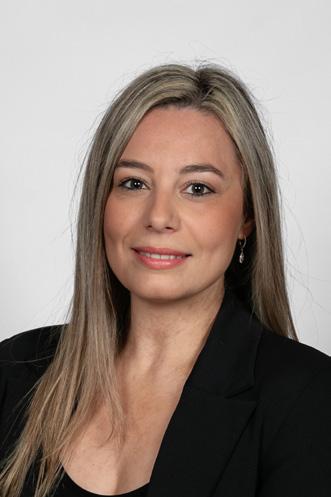
Nadia Willer Dean of Senior School nwiller@mazenod.vic.edu.au

Jamie Davin Dean of Junior School jdavin@mazenod.vic.edu.au

You must act, by following the Four Critical Actions, as soon as you witness an incident, receive a disclosure or form a reasonable belief * that a child has, or is at risk of being abused.
As a school staff member, you play a critical role in protecting children in your care.
You must act if you form a suspicion/ reasonable belief, even if you are unsure and have not directly observed child abuse (e.g. if the victim or another person tells you about the abuse).
It is strongly recommended that you use the Responding to Suspected Child Abuse template to keep clear and comprehensive notes, even if you make a decision not to report.
* A reasonable belief is a deliberately low threshold. This enables authorities to investigate and take action.
CONTACTING PARENTS/CARERS 4 PROVIDING ONGOING SUPPORT
If
is no risk of immediate harm go to Action 2
If a child is at immediate risk of harm you must ensure their safety by: separating alleged victims and others involved administering first aid calling 000 for urgent medical and/ or police assistance to respond to immediate health or safety concerns identifying a contact person at the school for future liaison with Police. Where necessary you may also need to maintain the integrity of the potential crime scene and preserve evidence.

As soon as immediate health and safety concerns are addressed you must report all incidents, suspicions and disclosures of child abuse as soon as possible. Failure to report physical and sexual child abuse may amount to a criminal offence.
For suspected student sexual assault, please follow the Four Critical Actions: Student Sexual Offending
You must report all instances of suspected child abuse involving a school staff
You must also report internally to:
GOVERNMENT SCHOOLS
School principa and/or leadership team
Employee Conduct Branch
DET Incident Support and Operations Centre
CATHOLIC SCHOOLS
School principal and/or leadership team
Diocesan education office.
INDEPENDENT SCHOOLS
School principal and/or school chairperson
Commission for Children and Young People on 1300 782 978
All allegations of ‘reportable conduct’ must be reported as soon as possible to:
GOVERNMENT SCHOOLS
Employee Conduct Branch
CATHOLIC SCHOOLS
Diocesan education office
INDEPENDENT SCHOOLS
Commission for Children and Young People on 1300 782 978.
DHHS CHILD PROTECTION
You must report to DHHS Child Protection if a child is considered to be:
in need of protection from child abuse at risk of being harmed (or has been harmed) and the harm has had, or is likely to have, a serious impact on the child’s safety, stability or development.
VICTORIA POLICE
You must also report all instances of suspected sexual abuse (including grooming) to Victoria Police.
You must also report internally to:
GOVERNMENT SCHOOLS
School principal and/or leadership team
DET Incident Support and Operations Centre
CATHOLIC SCHOOLS
School principal and/or leadership team
Diocesan education office.
INDEPENDENT SCHOOLS
School principal and/or chairperson.
If you believe that a child is not subject to abuse, but you still hold significant concerns for their wellbeing you must still act. This may include making a referral or seeking advice from: Child FIRST/The Orange Door (in circumstances where the family are open to receiving support)
DHHS Child Protection Victoria Police.
DHHS CHILD PROTECTION AREA
North Division 1300 664 977
South Division 1300 655 795
East Division 1300 360 391
West Division (Rural) 1800 075 599
West Division (Metro) 1300 664 977
AFTER HOURS
After hours, weekends, public holidays 13 12 78
CHILD FIRST
https://services.dhhs.vic.gov.au/ referral-and-support-teams
ORANGE DOOR
https://www.vic.gov.au/familyviolence/ the-orange-door.html
Your principal must consult with DHHS Child Protection or Victoria Police to determine what information can be shared with parents/carers. They may advise: not to contact the parents/carer (e.g. in circumstances where the parents are alleged to have engaged in the abuse, or the child is a mature minor and does not wish for their parent/carer to be contacted) to contact the parents/carers and provide agreed information (this must be done as soon as possible, preferably on the same day of the incident, disclosure or suspicion) how to communicate with all relevant parties with consideration for their safety.
Your school must provide support for children impacted by abuse. This should include the development of a Student Support Plan in consultation with wellbeing professionals. This is an essential part of your duty of care requirements. Strategies may include development of a safety plan, direct support and referral to wellbeing professionals and support.
You must follow the Four Critical Actions every time you become aware of a further instance or risk of abuse. This includes reporting new information to authorities.
VICTORIA POLICE
000 or your local police station
DET INCIDENT SUPPORT AND OPERATIONS CENTRE 1800 126 126
INCIDENT MANAGEMENT AND SUPPORT UNIT 1800 126 126
EMPLOYEE CONDUCT BRANCH (03) 9637 2595
DIOCESAN OFFICE
Melbourne (03) 9267 0228
Ballarat (03) 5337 7135
Sale (03) 5622 6600
Sandhurst (03) 5443 2377
INDEPENDENT SCHOOLS VICTORIA (03) 9825 7200
THE LOOKOUT
The LOOKOUT has a service directory, information, and evidence based guidance to help you respond to family violence: http://www.lookout.org.au. Family violence victims/survivors can be referred to 1800 Respect for counselling, information and a referral service: 1800 737 732
1 IMMEDIATE RESPONSE TO AN INCIDENT
If there is no risk of immediate harm go to Action 2
If a child is at immediate risk of harm
you must ensure their safety by: separating alleged victims and others involved administering first aid calling 000 for urgent medical and/or police assistance to respond to immediate health or safety concerns identifying a contact person at the school for future liaison with Police.
2 REPORTING TO AUTHORITIES
As soon as immediate health and safety concerns are addressed you must report incidents, suspicions and disclosures of student sexual offending as soon as possible:
DHHS CHILD PROTECTION
All instances on 000
Where necessary you may also

If you believe that: the victim’s parent/carers are unable or unwilling to protect the child the student who is alleged to have engaged in the student sexual offending is: aged over 10 and under 15 years and may be in need of therapeutic treatment to address these behaviours may be displaying physical and behavioural indicators of being the victim of child abuse*.
You must identify a contact person at the school for future liaison with Victoria Police and/or Child Protection and seek advice about contacting parents/carers (see Action 3).
*See the Four Critical Steps for Schools: Responding Incidents, Disclosures and Suspicions of Child Abuse for further guidance in these circumstances.
YOU MUST TAKE ACTION
As a school staff member, you play a critical role in protecting children in your care.
You must act by following the 4 critical actions as soon as you witness an incident, receive a disclosure or form a suspicion that a student is a victim of a student sexual offending and/or a student has engaged in sexual offending
ALSO report internally to:
School Principal and/or leadership team (all instances) Government Schools: DET Security Services Unit Catholic Schools Diocesan education office
You must act even if you are unsure and have not directly observed student sexual offending (e.g. if a victim, or another person tells you about the offence)
3 CONTACTING PARENTS/CARERS
Your Principal must consult with Victoria Police or DHHS Child Protection to determine what information can be shared with parents/carers of all impacted students. They may advise: not to contact the parents/ carers (e.g. in circumstances where contacting the parents/ carers is likely to adversely affect a Victoria Police investigation or where the student is a mature minor and has requested that their parent/carer not be notified) to contact the parents/carers and provide agreed information (this must be done as soon as possible, preferably on the same day of the incident, disclosure or suspicion).
DHHS CHILD PROTECTION AREA
North Division 1300 664 977
South Division 1300 655 795
East Division 1300 360 391
West Division (Rural) 1800 075 599
West Division (Metro) 1300 664 977
AFTER HOURS
After hours, weekends, public holidays 13 12 78
CHILD FIRST www.dhs.vic.gov.au
VICTORIA POLICE
000 or contact your local police station
DET SECURITY SERVICES UNIT (03) 9589 6266
STUDENT INCIDENT AND RECOVERY UNIT (03) 9651 3622
You must use the Responding to Student Sexual Offending template to keep clear and comprehensive notes.
4 PROVIDING ONGOING SUPPORT
Your school must provide support for students who are victim to a student sexual offence AND students who have engaged in a sexual offence. This is an essential part of your duty of care requirements. This support should include the development of a Student Support Plan in consultation with wellbeing professionals, outlining support strategies.
Strategies may include the development of a safety plan, direct support and referral to wellbeing professionals.
EMPLOYEE CONDUCT BRANCH (03) 9637 2595
DIOCESAN OFFICE
Melbourne (03) 9267 0228
Ballarat (03) 5337 7135
Sale (03) 5622 6600
Sandhurst (03) 5443 2377
INDEPENDENT SCHOOLS
VICTORIA (03) 9825 7200
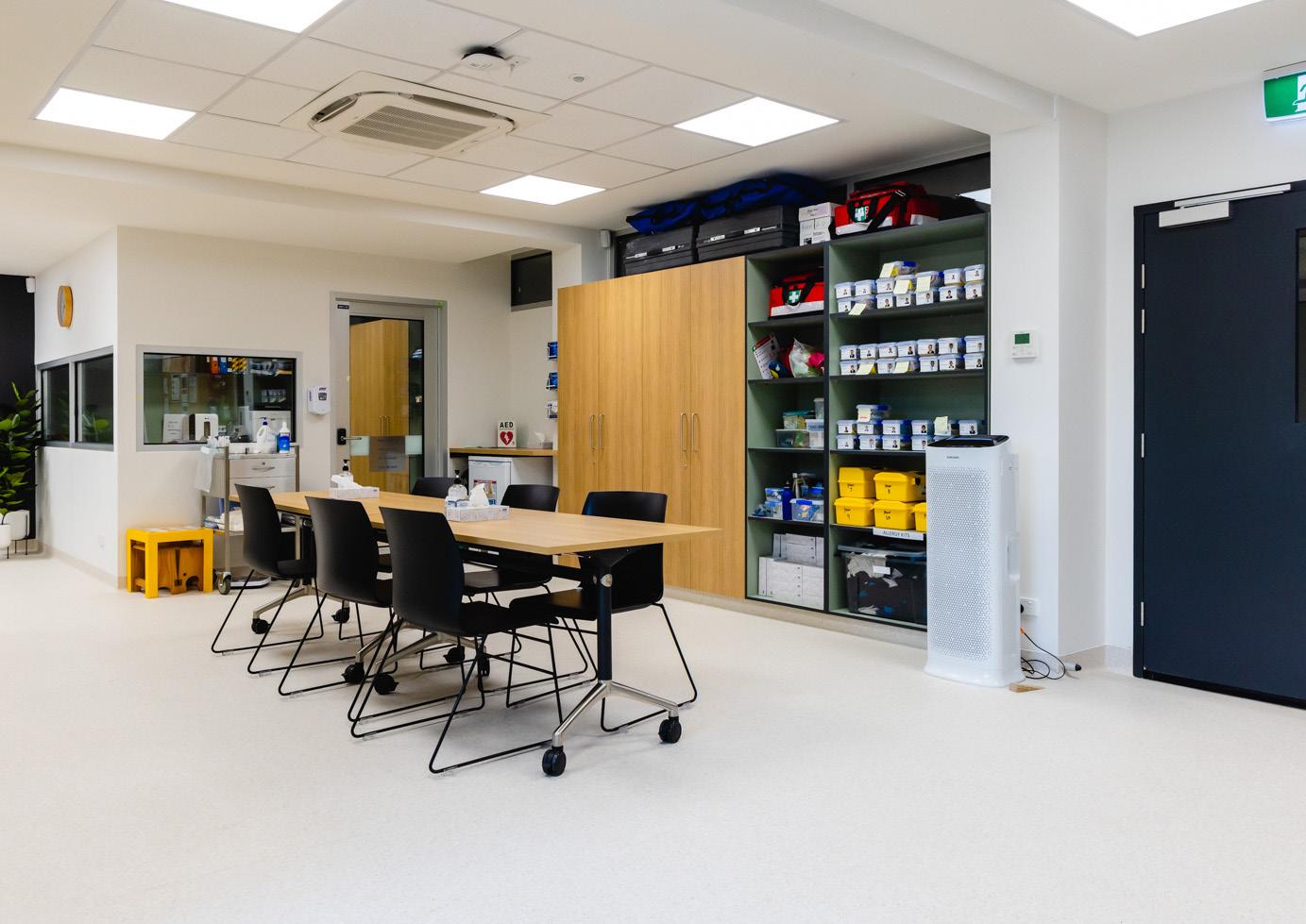
General Information
Staffed Hours: Monday - Friday 8:30AM - 3:30PM
Contact: ext. 1159
The Mazenod College Health Centre is staffed daily by two Division 1 Registered Nurses who all have extensive experience in emergency nursing. All new staff are encouraged to familiarise themselves with the Health Centre in the case of an emergency. The Health Centre aims to be an open and friendly place which encourages good communication between students, staff and families.
Any student who is unwell or injures themselves while at school must be assessed by the nurses during school hours. At all other times the supervising teacher is responsible for management. Students should not be left unattended in the Health Centre. The door into the Health Centre is never locked, even after hours. This ensures easy access to emergency equipment and action kits.
Anaphylaxis Action Kits
Each student who is at risk of Anaphylaxis will have their EpiPen (Adrenaline Auto Injector) along with their personalised action plan kept in the Health Centre in an individual container. These containers are labelled with the students name and photo and stored in alphabetical order. Each student is also required to have a second anaphylaxis kit (home kit) that is kept in their school bag. This is the kit that must be taken with them for any off campus activities. A student must not be allowed to board a bus without this kit being sighted by the teacher in charge. If the student does not have his home kit then he must be sent to the Health Centre to collect his school kit, which must be returned immediately on his return to school. A general use Epipen is included in every first aid kit that has a red tag attached.
All students who have a food or insect allergy must have an allergy kit at school. These are kept in the yellow first aid boxes in year level order. Students are also required to keep at second kit in their school bag. There is an anti-histamine included in every first aid kit.
As per school policy every student who has a diagnosis of asthma must have an Asthma Action Plan that is updated annually. Spare Ventolin and spacers are located on the silver trolley in the Health Centre, in asthma action kits located around the school, and in every first aid kit.
Specialised general use emergency action kits for Anaphylaxis, Asthma and Diabetes are kept in the Health Centre just inside the main door. We have additional kits located around the school in Reception, the Provence Centre (staff office), the Founders Complex, the Canteen, the Food Technology kitchen, the O’Rourke building (upstairs between Year Level Leaders' offices) and the Chapel (sacristy).
AEDs are located in the Health Centre, The Provence Centre, The Founders Complex, The Chapel (Sacristy), The O’Rourke Building (upstairs between the Co-ordinators offices).
Medical Information for students in your classes is available on Consent2Go. You can select your class and view students’ medical information. Students at risk of anaphylaxis are marked on your class lists with a medical alert.
If you are concerned about a student’s health please do not send them to the Health Centre alone. Please ensure they are escorted to the Health Centre by a staff member or a responsible student.
For safety reasons all medications must be kept in the Health Centre rather than carried by students. Parents or a Medical Practitioner are required to give specific consent for the administration of medications at school (excludes emergency medication for asthma and anaphylaxis/allergies). Students must not be administered medication by staff without gaining written consent from the parent/guardian.
First Aid kits must be taken whenever students are taken off campus. It is the responsibility of the teacher to notify the nurses and organise to collect the kit. Each first aid kit should contain an Epipen. This will be highlighted by a red band placed around the handle. A Mazenod College Injury Form is to be completed for all first aid provided to a student, and handed to the nurses.
There are some members of our College community who are immunosuppressed. This puts them at serious risk if they are exposed to infectious illnesses, in particular, chicken pox, measles, mumps or shingles. If you are diagnosed with any of these illnesses, please inform the nurses ASAP.
There are a number of health related online training courses that are mandatory for staff to complete. These include:
• Anaphylaxis online training. Must be completed every 2 years, which includes verification of EpiPen administration. Verification will be done by the Health Centre nurses. You will receive an email with the required links when you are due to update your training. If you have previously completed this and it is still current, please provide a copy of your signed certificate to the nurses.
• Attendance at biannual Anaphylaxis briefing presented by the nurses.
• Asthma online training, to be completed every 3 years.
Please visit the Health Centre tile on Mazcom for links to the online training courses. https://mazcom.mazenod.vic.edu.au/homepage/3631
The nurses have compiled a selection of relevant health information for students. This information can be accessed on MazCom > Staff Services > Health Information, or by using this link: https://mazcom.mazenod.vic.edu.au/homepage/8885
Year level leaders and Pastoral Leaders are encouraged to make students aware of this resource. Should staff require additional health information or resources please contact the Health Centre.


Some of the most memorable and meaningful learning experiences are had outside the boundaries of the traditional classroom, on excursions and through visiting speakers. The College supports teachers to create these experiences with these caveats:
1. Child safe and compliance frameworks are in the foreground, with all requirements met
2. Disruption to learning is minimised
A teacher or teaching team intending to run an incursion or excursion should follow this procedure:
1. Discuss the experience with the Head of Faculty and receive inprinciple support, including funding support
2. Complete an excursion application form – this can be found on MazCom > Staff Services
This form will notify the Deputy Principal (Learning and Teaching), and Director of Staffing. If these two support the proposal on learning and staffing grounds, it will receive approval to proceed to compliance. At this stage the Daily Organiser and Front Office staff will be automatically notified for entry into the College calendar and Daily Org.
3. Complete the Mazenod College risk assessment and Consent2Go application. While staff are responsible for this step, assistance should be sought from the Director of Risk and Compliance
4. Complete Risk Assessment. Form on MazCom > Staff Services > Policies > Staff Forms > Mazenod Template Risk Assessment
5. MazCom > Consent2Go (Click icon) > Add Event > Excursion or Incursion > Complete proposal and send for approval. Complete planning


At Mazenod College there is a ‘whole school’ approach to student wellbeing. This is supported and made possible by the network of staff who have exceptional knowledge of students, who maintain positive relationships with them and their families and who work with students to address a variety of personal concerns. One layer of this support is Mazenod’s Counselling Service, which is located in Tempier House.
Counselling gives students the opportunity to talk with a psychologist, who can offer support and new perspectives on many personal issues. It is designed to give students the time, space and encouragement to explore and understand the issues of concern. While counselling is not a magical or an instant cure, it can clarify problems and help in their resolution. Within this context, Mazenod College’s Counselling Service is available to assist students, their parents and staff with a range of student related issues inclusive of, but not limited to:
• Relationships and Social Issues
• Self-Esteem Issues
• Anxiety
• Depression
• Grief and Loss
• Stress Management
• Anger Management
• Developmental Disorders
• Drug and Alcohol Issues

Tayla Chellew School Psychologist dmunro@mazenod.vic.edu.au
To access counselling, the Counselling Team require a referral form to be completed (unless there are exceptional circumstances). There are several ways in which a referral can be completed:
• The student can come up to Tempier House or make contact (e.g., via email) with one of the psychologists and complete a self-referral form
• Parents can contact a psychologist through the College Administration and complete a referral form on behalf of their son. These can be downloaded from MazCom > Student Services
• College Nurses, the Gifted and Enhancement Leader, Year Level Leaders or members of the College Leadership Team can complete a referral form in consultation with the Counselling Team.
Teaching staff who hold concerns for students are asked to contact the relevant Year Level Leader as they are likely to be in possession of information about the student and whether they are already engaged in counselling.
If you would like to know more about Mazenod College’s Counselling Service or referral processes you are welcome to contact one of the psychologists or visit Tempier House.

Andrew Steer School Psychologist asteer@mazenod.vic.edu.au
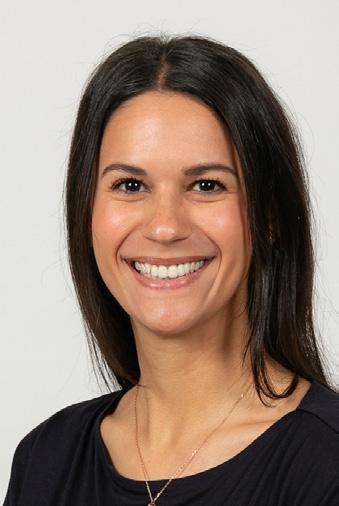
Rebecca Ferrarotto School Psychologist rferrarotto@mazenod.vic.edu.au

Rosemary Kucan School Psychologist rkucan@mazenod.vic.edu.au

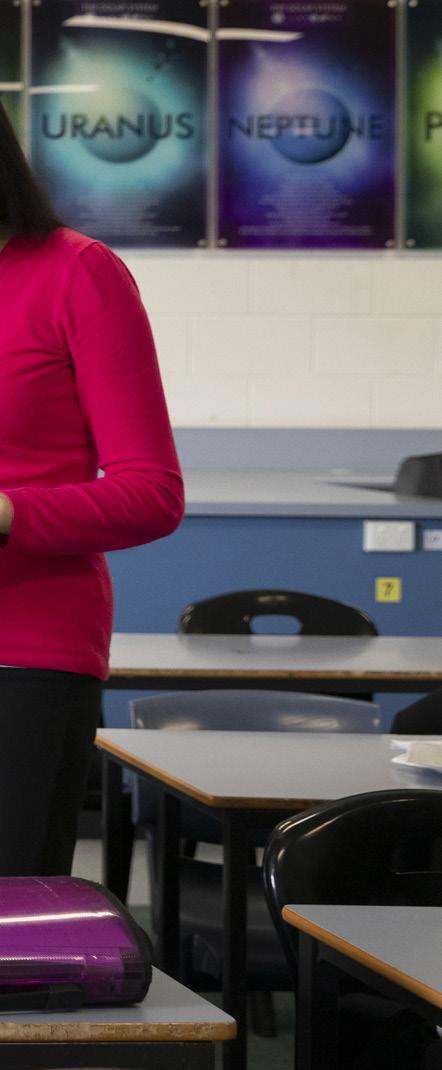
Organisational and administration information is posted on MazCom. VCE information relevant to your VCE subject will be distributed to you generally by the Dean of Studies, VCE Administration and Exams Coordinator or your Faculty Head.
Increasingly, Faculties host curriculum documentation on OneNote, accessed through the General Channel in each Faculty’s MS Team
As a school with students who have disabilities or additional needs, teaching staff need to be aware of the mandated obligations under the NCCD. The Learning Diversity Team will be able to support teaching staff in:
• identifying the needs of the student
• consulting with parents and guardians, as well as other teaching or support staff
• providing the necessary adjustments to assist students and address the identified needs
• monitoring and reviewing the impact of adjustments
Teaching staff have access to Personalised Learning Plans (PLP) of students who have identified needs, in MazCom > Staff Services > NCCD. Teachers can also find learning profiles of students which are updated regularly, as well as other general lists and resources to assist teaching staff who may have students who are considered disabled or require additional support.
Teaching loads are constructed working to a maximum of 22 periods. Once constructed, individual allocation is calculated by counting the minutes in the week.
The normal teaching allocation for a full time staff member is 18.5 hours face-to-face. Part time staff are allotted a pro-rata face-toface allocation. Pastoral Group is counted as 90 minutes of that load.
The Industrial Agreement stipulates that a full time staff member, on load, transitions to 0 extras from 2025 onwards.
Staff who are underload can expect to receive replacements as appropriate to bring them up to load. Some staff have loads that are averaged across terms or semesters. All staff still receive the usual yard duties.
To maintain the safety of all students in the College, the Director of Staffing has the responsibility of assigning staff to supervise the activities of the students outside of class time.
Teaching staff who are full time receive up to three yard duties. Teaching staff who are part time (.8) receive two yard duties. Teaching staff who are part time (less than .8) receive one yard duty.
There are five assignable periods for yard duty:
• Before School
• Recess
• Lunch 1
• Lunch 2
• Bus Duty
Greater details regarding teaching loads, duties, attendance, and time-in-lieu arrangements can be found in the Mazenod Teaching Staff EBA booklet.
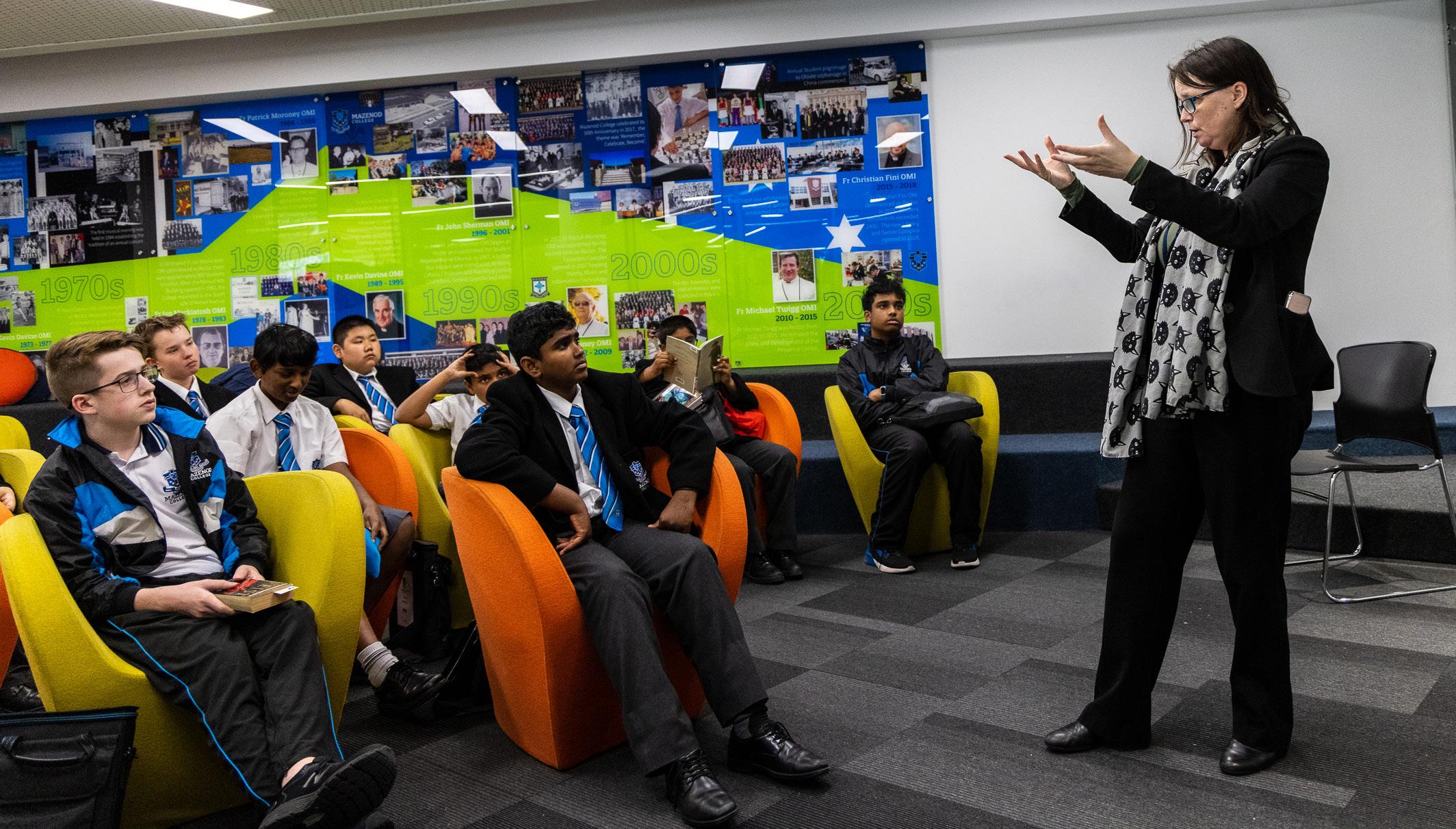
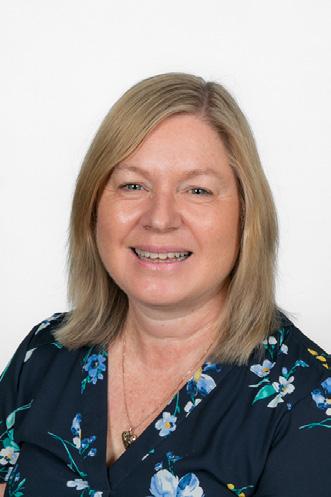
Lisa Burger Head of Library lburger@mazenod.vic.edu.au

Jess Neville Teacher Librarian jneville@mazenod.vic.edu.au

Maree Martin Senior Library Technician mmartin@mazenod.vic.edu.au

Brigitta Macdonald Library Technician bmacdonald@mazenod.vic.edu.au

Jane Fagan Library Technician jfagan@mazenod.vic.edu.au
General Information
Staffed Hours:
Monday - Thursday 8:00AM - 4:30PM Friday 8:00AM - 03:30PM
School Holidays: Closed Contact: librarystaff@mazenod.vic.edu.au
• OCLC Discovery - a dynamic interactive learning experience for research and recreational reading including access to ebooks and online resources.
• Curated research databases, websites and Library guides
• Access to an extensive range of age appropriate digital books on the Sora ebooks and audio books app, including both Mazenod Library and 'Your Library' digital collections
• Britannica Schools - Includes Encyclopedia, Articles, Media, Biographies, Compare Countries, World Atlas & Tour Australia, Web’s Best Sites and Primary Sources
• Ebsco Australia/New Zealand Points of View Reference Centre – Containing resources that present multiple sides of a current issue this database helps students realise and develop persuasive arguments and essays, better understand controversial issues and develop analytical thinking skills
• Ebsco Australia/New Zealand Reference Centre - A multidisciplinary database including full-text collection of leading regional and international periodicals, reference e-books, biographies and images
• Access Australia - Over 100 local and international newspapers including digital replicas of The Age, The Herald Sun, The Australian, and The Financial Review
• Echo – Media issues analyses including background, arguments for and against, links to multimedia and text items / information, further implications
• ClickView – Curriculum aligned video content and learning and teaching resources
• SLASLA Online Referencing Generator – for APA Referencing.
Teacher-Librarians collaborate with subject teachers and teach students to effectively research and reference. Library staff curate reliable and current digital resources for best practice, assisting students in their studies and assignments.
Teacher-Librarians can team teach with you to:
• Develop research, digital citizenship and information literacy skills
• Teach use of databases, search engines and online resources and referencing skills
• Support the integration of ICT into the curriculum through the use of digital resources
• Teach research and bibliography writing skills alongside the classroom teacher
A Teacher-Librarian organises and teaches fortnightly reading classes are held Year 7, 8 and 9 students with their English teacher in the Reading Room. Mazenod Library staff promote reading through the extensive, up-to-date, relevant and age appropriate collection. A wide variety of reading materials are available for recreational and informational reading needs including fiction books, non fiction books, graphic novels, manga, ebooks and audio books. Reading classes can be booked in for any subject.
• Book online via MazCom – book the space you require
• Consult with teacher-librarians to ensure your class has available support and is using the best possible resources
• Request a resource list of recommended reading on a particular area of study
• Up to 5 unaccompanied students may be sent on a pass at any one time
• Supervision of individual student tests can be arranged by emailing librarystaff@mazenod.vic.edu.au and booking in Staff Services on MazCom
Clubs
• Student Tech Club
• Book Club
• Yarn Club Events
• Book Week
• Literature Festival
• Author visits
• Victorian Premiers' Reading Challenge


Anne Johnson Director of Learning Diversity ajohnson@mazenod.vic.edu.au

Phillipa Kirwan Dean of Learning Diversity pkirwan@mazenod.vic.edu.au

Suzana Cunha Learning Diversity Psychologist scunha@mazenod.vic.edu.au
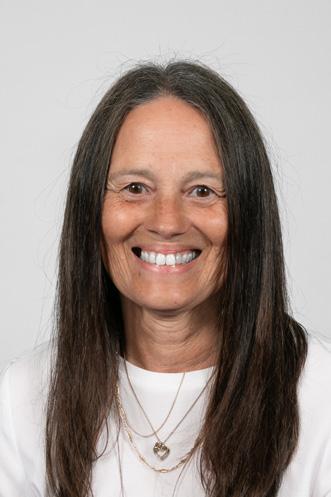
Edna Flanagan Learning Diversity Leader (7-9) eflanagan@mazenod.vic.edu.au

Paul Harrup Learning Diversity Leader (10-12) pharrup@mazenod.vic.edu.au
The Learning Diversity Team is an integral part of Learning and Teaching at Mazenod College. The well-resourced team consists of qualified teachers, learning support officers and a learning diversity psychologist who work collaboratively with teaching staff to ensure that all students are provided with learning opportunities that encompass the whole person.
The Learning Diversity Team is based in the Penola Centre which is located in the Year 9 corridor.
• Academic support for students with disabilities
• Assistance to teachers in planning and implementing strategies that facilitate access to learning
• Development of student learner profiles and personalised learning plans through Program Support Group meetings
• Assistance to faculties in the development of tasks and assessments that are universally accessible to all
• Facilitation of targeted literacy and numeracy interventions
• Collaboration with Counselling, Pastoral and Teaching teams to develop systems of support
• Management of NCCD data collection process
• Homework Program
• Inclusive lunch time activities
• Supervision of individual student tests can be arranged by emailing learningdiversity@mazenod.vic.edu.au
Teacher concerns regarding student progress should follow the Learning Diversity referral process as outlined below.
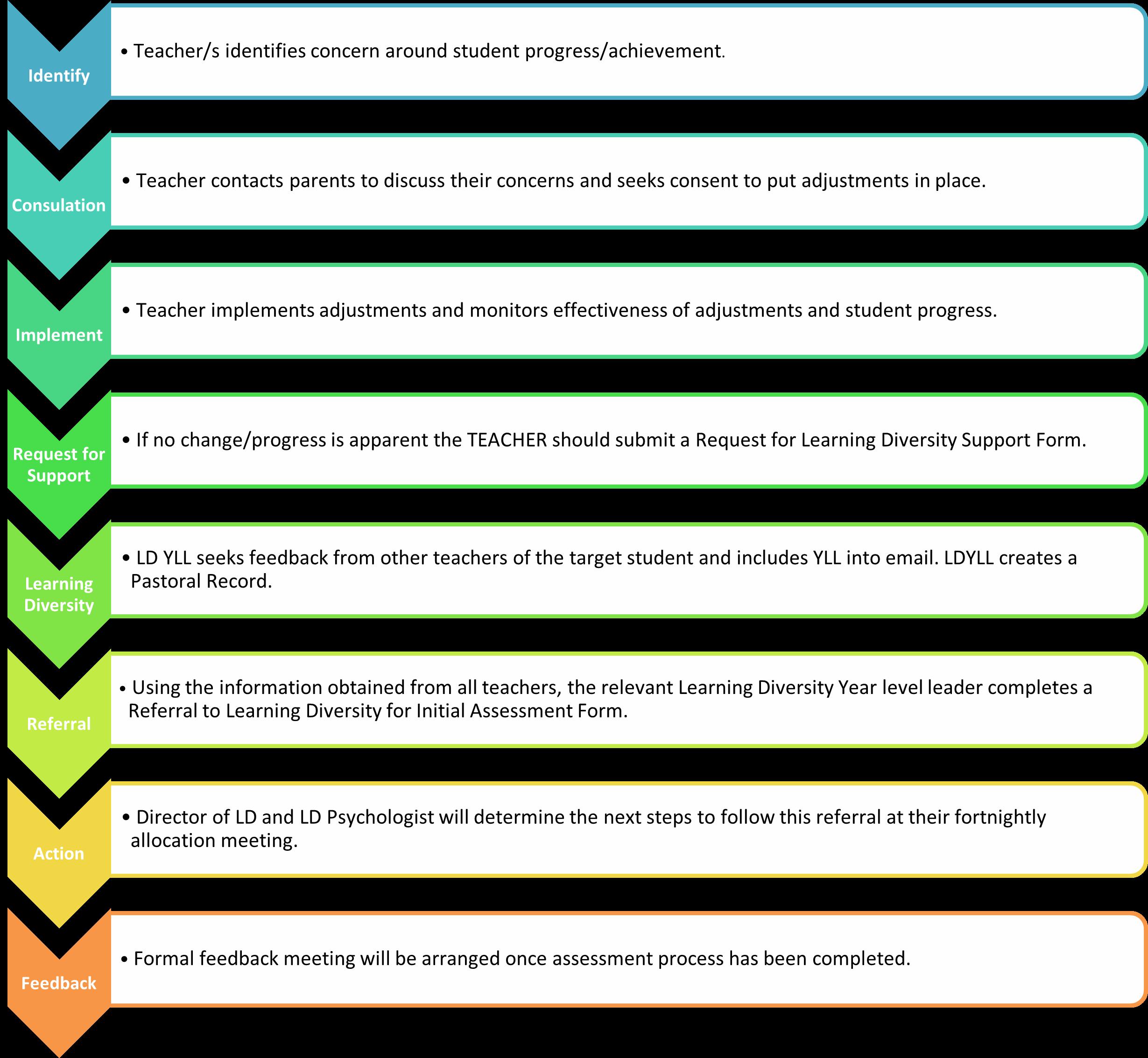
Parents often choose Mazenod College as a school of choice because of the clear focus on respect and restorative practices in the classroom. Maintaining these standards is a constant team effort relying on all teachers.
Teachers are expected to speak to students with respect. This involves avoiding any language that diminishes, demeans, or intimidates students, whether in humour or seriousness.
Teachers are asked, where possible, to refer to students by name, or collectively as ‘gentlemen’ or ‘students’ rather than ‘boys’. This speaks to our recognition that our students are engaging in a process of maturation and that we should be aspirational in our language. Teachers are expected to come to class prepared as a professional sign of respect for the students and the learning process.
To return this respect, students are expected to:
1. Stand in respect each time a member of staff or visiting adult enters the room. Staff are asked to insist on this protocol, unless students are actively engaged in a test or assessment
2. Refer to teachers by their correct title and name (Mr, Mrs, Ms, Dr etc)
3. Raise their hand when speaking, and accept reasonable directions from staff at all times
4. Follow the instructions in each classroom regarding positive behaviours while waiting for a teacher to arrive (organise, revise, practice, read)
5. Wear their uniform correctly. Staff are asked to check this at the commencement of each lesson
6. Use their laptops for educational purposes (teachers may use EdQuire to monitor this)
It is an expectation that each class begins with an acknowledgement of God’s presence in our learning, through prayer or a moment of silent reflection. In Period 3 this is led collectively over the loud speaker, but in other classes this may be led by a teacher or student.
The student diary is an integral part of a Mazenod College student’s life. It is the starting point of organisation, the source of College rules and the vehicle for communication.
All students should use the diary to record homework and assignments. Regular use of the diary should foster these habits. Unsuitable pictures and graffiti should be actively discouraged. If the diary is in such poor state that the student needs to replace it, another may be purchased from the Student Counter.
To ensure that classroom cleanliness is maintained, Pastoral Leaders should devise a roster, which includes the duties of closing the windows, emptying the bin and cleaning the whiteboard. At the end of Period 6 the teacher in the classroom supervises the cleaning of the classroom, closing of windows and lifting chairs on tables on designated days.
Mazenod College acknowledges the directive from the Education Minister in 2020 that students who choose to bring mobile phones to school must have them switched off and securely stored in their individual lockers during school hours. The College also acknowledges some students may not yet have the moral development or social maturity to always make good and safe decisions. The safety and well-being of students and staff is paramount. The purpose of this document is to outline the conditions in which mobile phones can be used.
1. Phones that are left on are a distraction to the owner and other students
2. Valuable items that are not used directly for educational purposes should be left at home to avoid the chance of them being lost or stolen. As well as the personal cost and inconvenience to the owner, considerable time can be spent investigating a stolen/lost item
3. Phones can be a distraction from studies
4. Students should not be in a position to contact friends and acquaintances during school hours. Security is of great concern and incidents of contact with outside people or agencies could pose a threat to the general school community
1. Mobile phones are to be turned off and put away between 8:30AM and 3:10PM, apart from the following instances, where expressed permission is given by the teacher in charge. Examples of Educational Circumstances (for mobile phone usage):
• Recording a discussion in a language class
• Videoing an activity such as a skill being demonstrated in drama, music or sport
2. Parents are requested not to contact their sons on their mobile phone during school hours but by contacting reception
3. The phone is an item of considerable value. The student and his parents/guardians accept total responsibility for its security.
4. The phone is only used for the reasons as outlined in the application
5. The use of photographic and recording facilities on the phone is strictly prohibited due to legal and social reasons, except for educational circumstances where expressed permission is given by the teacher in charge
6. The secretive or unauthorised photographing or video recording of any member of staff at any time is forbidden
7. Unauthorised use of a mobile phone may result in its confiscation. If this happens the phone will be held in the College safe for a period of time (up to one week) before it is returned to the student, or a parent/guardian is requested to collect it. Students will be given access to a College phone if they need to contact their parents. The College reserves the right to check a student’s phone at any time for inappropriate material

The Pastoral Leader sets the tone for the year. A positive, friendly atmosphere in the Pastoral Group is more likely to draw positive responses from the students in a range of circumstances. In giving respect to each student the teacher sets the standards of behaviour, which all teachers can expect, from each and every member of the Pastoral Group. Students show this by standing when the teacher enters and leaves the room, by listening politely when someone is speaking and by addressing each other in a suitable manner.
The Pastoral Leader is most likely to be the first to pick up when students are having difficulties. Students always appreciate a sympathetic ear and if teachers are in need of further assistance then the Year Level Leaders should be approached.
Prayer Life begins with the Pastoral Leader. Prayers take place during Pastoral Group but the format varies considerably. Many teachers use the prayer displayed on MazCom with the teacher or student reading it with the class dwelling on its meaning and relevance for the day. Other teachers use the front of the diary, which has a standard format for an introduction, which can then be followed by one of a variety of prayers, listed there. A thoughtful selection of prayers with some attention to variety and relevance is conducive to a prayerful response from students. This may take the form of selections from above sources, readings from the bible, or a song.
On days of special significance (Ash Wednesday, Anzac Day, Remembrance Day, etc.), the Pastoral Leader should assist the Liturgy Prefects to lead liturgical celebrations with his or her class.
The pastoral time starts at 8:40AM each day, and students should be greeted by the presence of the teacher as they arrive. During this time the Pastoral Leader is checking in on the wellbeing of individuals and the class as a whole, and using that time to build a welcoming community. They have the capacity to mark students Absent, Present or Late.
Students are required to bring a note from home to explain an early departure. Early departure notes are to be signed by the Pastoral Leader and the student then proceeds to the Student Counter to register the early departure.
The Student Counter house clip board folders that contain up-todate Pastoral Group lists for teachers to mark attendance on the occasion MazCom/Synergetic/SynWeb is down or for emergency evacuations.
Although rare, when having to mark a printed roll in the clipboard, if a student is present, a written “P” is placed in the first box. If a student is not present he is marked absent with an “X”.
Students that arrive after 8:50AM should report to Student Counter to sign-in. Teachers are to adjust the roll once the Students enter the Pastoral Group time. Students must have a late-pass to enter class after this time.
It is College policy, noted in the diary, that parents should contact Reception before 9:30AM if the student is to be absent. If no phone call is received to explain their absence, an SMS will be sent to their nominated absentee SMS contact. It is vital that Pastoral Leaders and all subject teachers complete the online attendance accurately in order for data to be ready for an SMS to go out after recess.
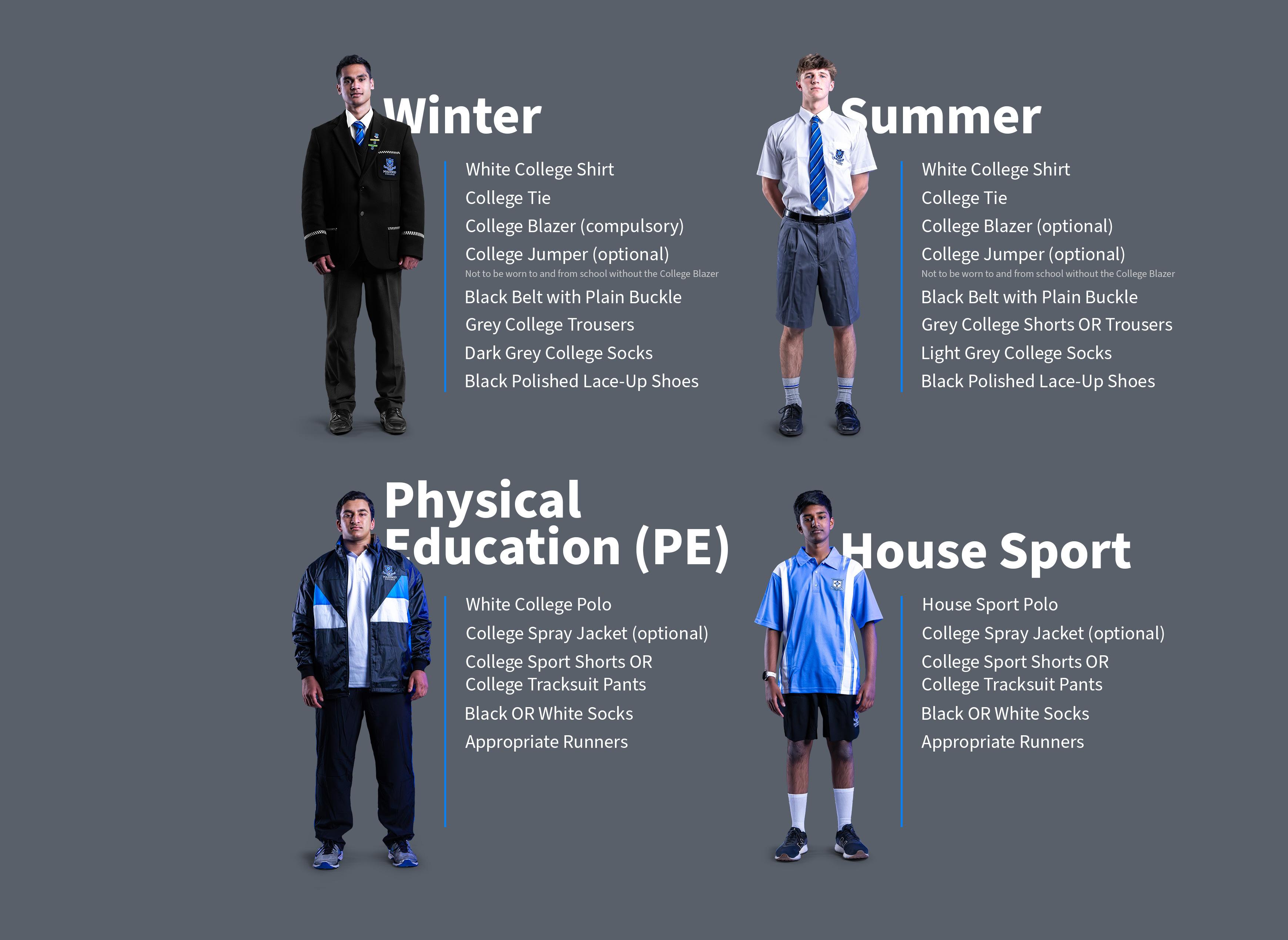
• Hair must sit above the collar at the back and be no longer than half an ear at the sides, with sideburns also no longer than half an ear
• The fringe must remain clear of the eyes and face
• Hair should be a graded, even cut, no shorter than blade 2. An even cut means that shorter hair at the back and sides must be blended gradually into the longer hair on top, two distinct lengths or undercut styles are not permitted
• Layered cuts, use of hair ties and tinting, colouring or streaking are not permitted
• If a fringe is long enough to be tucked behind the ears, it is too long and needs to be cut
• There are to be no mullet style haircuts. This includes faux or short mullet styles where the fringe and back of the cut is shorter, with the side above and near the ears being shaved
In rare circumstances, an exemption to aspects of the haircut guidelines, can be requested by families with supporting documentation from relevant authorities. An exemption would still carry expectations around presentation and compliance. Examples of exemptions would include Religious, Cultural, including for a period during a school production, Medical, particularly around gender identity and medical issues that have symptoms that affect hair. Other requests based on a case-bycase basis.
Exemption requests are to be directed to the Deputy Principal (Students) with appropriate documentation for consideration. The Deputy Principal (Students) will present the request to the Principal and Rector for approval.
The College will be the final arbiter on acceptability of haircuts. Any student who chooses not to comply with these expectations may be asked to stay at home until the issue is rectified.
• Students are to be always clean shaven this includes during exam periods
• Students who arrive at school unshaven will be required to shave at the Health Centre before they enter class
• Parents are requested to ensure their son is given the support he needs once it becomes time for him to begin shaving
• Apart from items of religious significance, no jewellery is to be worn by students either at the College or on the way to and from the College
• In particular, the wearing of any piercings (this includes facial and tongue piercings, clear plugs, rods or any other clear dressing, earrings, studs, or sleepers) is not permitted
• It is not acceptable to cover such items with a Band-Aid or other dressings. Students found wearing jewellery will need to remove it and may be suspended from classes if they do not comply
During Terms 1 & 4 students are to wear white shirts to assembly. During Terms 2 & 3 students are to wear the College blazer to assembly.
Any variation to uniform requirements due to weather conditions will be at the discretion of the Deputy Principal (Students).
Please refer to the Mazenod Klad Uniform price list located on MazCom and the Mazenod College website.
https://www.mazenod.vic.edu.au/admissions/college-uniform https://kladuniforms.store.simplify.com/
If a student does not have the full sport uniform, he must wear his academic uniform and change at school. Students are permitted to wear their sport uniform only on their designated sport day.
When students have timetabled Physical Education classes, they must change in and out of their sport uniform in the changerooms.


STUDENTS GATHER MATERIALS AND LINE UP
TEACHER ENTERS CLASSROOM ALONE TO SET UP STARTER ACTIVITY


STUDENTS ENTER QUIETLY AND BEGIN THE STARTER ACTIVITY WHILE TEACHER STANDS AT THE THRESHOLD
TEACHER MONITORS STUDENT WORK AND MARKS ROLL


FORMAL START TO THE LESSON WITH LESSON GOALS AND PRAYER WHERE APPROPRIATE
Mazenod College employs a multilayered approach to wellbeing that is designed to improve and sustain both staff and student’s mental fitness. Visible Wellbeing is a whole school approach that encourages all areas of the College to build wellbeing capacity in each classroom and activity utilising the SEARCH framework. Personal and Social Learning is the explicit teaching of wellbeing that is taught during Pastoral Group time. Personal Development Days and seminars are scheduled at each year level addressing age and stage wellbeing issues and education.
Visible Wellbeing combines the science of wellbeing with the science of learning to achieve the three key goals of:
• helping students and staff to see more clearly their own and others’ wellbeing using visible wellbeing practices
• helping students and staff systematically build wellbeing using the SEARCH framework
• facilitating learning through the visible wellbeing classroom process.
Visible Wellbeing is not a set curriculum, it is a flexible approach which can be applied across any subject matter or area of the College.
The explicit teaching of wellbeing occurs during the regular Pastoral Group time on Fridays. Year 7 have an additional timetabled weekly period of PSL. To compliment the Visible Wellbeing approach, The Resilience Project student curriculum, teacher resources and digital content are used at Year 7 to 9. Research suggests, the more positive emotion you experience, the more resilient you will be. Gratitude, Empathy and Mindfulness, with Emotional Literacy are the foundational skills taught to practise these strategies. At Year 10 to 12 further topics such as Consent, E-safety, and Respectful Relationships along with other age and stage wellbeing content are taught.
You can learn more about Visible Wellbeing on MazCom or on the College website.
https://www.mazenod.vic.edu.au/school-life/visible-wellbeing
The SEARCH framework is delivered to bring wellbeing to life in practical and accessible ways in all classes and across cocurricula. The VWB techniques help teachers to use the learning process itself as a delivery mechanism to build student wellbeing. You can view Lea Waters' SEARCH framework model below.

We encourage all staff, new and existing, to visit the VIA website below and discover their character strengths by completing the VIA Character Strengths Survey. https://www.viacharacter.org/
Learn about key concepts from the field of Positive Psychology and how you can utilise the ideas to support the wellbeing of students, your colleagues and yourself using the SEARCH framework to guide you.
https://vwb.thinkific.com/courses/vwb-online-access-formazenod
The Mazenod curriculum is designed to engender the integral development of students, encouraging physical, intellectual, moral, creative and spiritual growth in a supportive and co-operative learning environment. To provide this co-operative learning environment, certain expectations are placed upon the student. The management of students involves teachers, parents and the students themselves as they learn self-discipline within the Restorative Practices Framework.
Restorative Practices focuses on helping students become aware of the impact of their behaviour on others through personal accountability and learning from a conflict situation. An important component of this approach is the focus on restoring relationships after harm has been sone. The Guiding Principles of Restorative Practices are to engage in:
• A learning process that enables a young person to learn how others have been affected
• Dialogue that is void of blaming, judging and accusations
• A process where the people most affected are involved. Punishment is not the messenger for learning. The people involved in the restorative process become the instruments for learning and for repairing the harm to the relationship
• A process where we consciously separate the deed from the doer with the focus on the behaviour that has harmed the relationship
• A process whereby any serious wrongdoing and conflict is seen as an opportunity for learning.
When conflict arises, a restorative approach includes asking questions such as:
1. What happened?
2. Who do you think was affected / hurt?
3. What needs to happen to make things right?
4. If the same situation happens again, how could you behave differently?
5. What support do you need? Who can you go to for support?
It is to be noted that Restorative Practices is not consequence-free. Working through the rigorous process enables students to account for their behaviour, make reparation and learn from the experience.
A team approach is taken by all staff; in particular, the Pastoral Team involves the Pastoral Leaders, the Year Level Leaders, the Dean of Junior and Senior School, the Psychologists and the Deputy Principal Students.

For us to be engaged in our learning we need to be safe, included, respectful of ourselves and others.
Helpful behaviour
Have your learning materials for class
Following teacher instructions
Waiting patiently for help
Raising hand to speak
Helping others
Staying on task
Minor unhelpful behaviour
Use appropriate language
Working quietly
On time to class
Behaviour that has minimum negative impact on others and mostly impacts the learning of the student himself
Moderate unhelpful behaviour
Teasing or name-calling
Damage someone’s property
Refusing to follow instructions
Behaviour that impacts on the student learning and the learning of others
Bullying
Verbal abuse to staff and students
Vandalism Physical abuse
Repeated disruptions
Wasting time
Include others
Being kind
Inform teacher of your concerns
Stealing Illegal substance Vaping
Severe harmful behaviour
Damaging property
Swearing
Complete tasks on time Be organised for class
Truancy
Threatening someone
Serious breach of ICT policy
Intimidating behaviour
Repeated yellow behaviours
Playing games or music on
Raise voice
Mobile phone out of locker
Off task
Chewing
Lining up for class
Respect others in class
Respect others’ personal property
Looking after and using equipment/facilities with care
Mazenod College seeks to provide the means by which the full potential of each of its students and that of the school community is realised. Staff are encouraged and supported to use relationship-based approaches to establish consistent expectations for behaviour.
Mazenod College also seeks to instil in its students a sense of their own worth and to promote initiative, self-reliance, integrity and leadership. There is also the broader objective of instilling in students a genuine respect for all, especially those of different cultural and social backgrounds. In regards to discipline the College’s ultimate aim is for all members of the community to regulate their behaviour in such a way that these outcomes are achieved through self-discipline rather than externally imposed sanctions.
It is the responsibility of all staff to:
• place the pastoral care of students at the forefront of all that they do and every decision that they make
• foster positive, respectful and appropriate relationships with students, parents and staff
• support and promote each student as a valued member of our community
• support students in learning
• support colleagues
• provide a curriculum which is appropriate and designated to encourage students to succeed and maximise their potential
• undertake professional development
• encourage and support students to take responsibility for their own behaviour
• be consistent in the implementation of the policies of the school
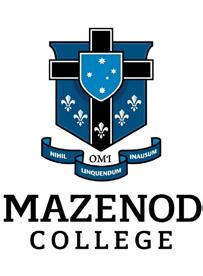
Student is reminded of College and class expectations. Following this, teachers should attempt to re-engage the student in the lesson as soon as possible, building a sense of success.
“In this class we remain seated unless we ask the teacher” “The next question is for you; come up and help me with the next problem”
Where possible, the student is moved within the class, possibly to a seat nearer the front. This is explained as a means of empowering the student to concentrate.
“This is not a punishment, I want you to be able to concentrate because what we are learning is important.” “Come up here where you will be less distracted”
Student is asked to wait outside the room briefly while the teacher settles the class. The teacher then leads a reflective conversation, in which the student gets to speak.
“What do you think happened to lead us to this point” “The way I saw it was ..... This topic is important and I need to be able to teach” “Your behaviour is making that challenging”
Pastoral Note 04
When required, teacher to add pastoral note on the student’s Pastoral Care tab in MazCom.

o ences, Illega activities, Major the , Serious violence RESTORATIVE/ SUSPENSION/ NEGOTIATED TRANSFER/LEGAL
4 The , Physica violence Susta ned bu y ng/harassment, Destruct on of property Gra t ,
Possess on of i legal substances/items
O ensive behaviour towards a teacher
RESTORATIVE PROCESS/SUSPENSION/CONTRACT
LEVEL 3
“Low level” harassment Bystander in a fight
3 detentions n one term, Unsafe/destructive behaviour on transport
Unsafe/destructive behav our at school
Cont nued and sustained disrupt on of lev el 2 disrespectful behav our towards a teacher
Corporal Punishment, or the threat thereof, is not permitted at Mazenod College. LEVEL 5
RESTORATIVE PROCESS/SATURDAY DETENTION
LEVEL 2
Cont nued disrupt on of learning/leve 1 behaviour
nappropriate behaviour in a publ c place,
O ensive/inappropr ate language or behaviour, Continued uniform infringements, Continued lateness to class or unexpla ned absences
RESTORATIVE PROCESS/DETENTION
LEVEL 1
ncessant talking/disrupting the learning environment Failure to comply with teacher directions
Misuse of ICT, O ensiv e/inappropriate anguage, Breaking “hands o ” ru e,
Absent/late to class or homeroom, Failure to complete homework, Failure to submit an assessment task without a valid reason, Using another student’s possessions without their permission
1. Community Service will involve a student spending a part of their lunchtime or recess contributing in some way to the College community e.g., tidying the yard or room.
2. Restorative Processes involves a formal meeting with the people involved in the incident to restore the relationship that has been hurt or damaged. It involves an apology and a commitment.
3. Detentions will be of 45 minute duration. Saturday detentions will be from 9.00AM - 11.00AM as required.
4. Suspensions can be external/internal where the student may be expected to come to school to work in an area apart from other students. Out of school suspensions” are a very serious consequence that involves excluding the student from school until a meeting with the parents/ carers. Please refer to MACS policy.
Important Note: The consequences for a breach will be based on the severity of the breach, and on prior disciplinary actions. Consequences are not progressive but will be applied as appropriate.


Our Learning and Teaching framework at Mazenod College recognises that young men learn best when learning goals and expectations are clear, and respect is reciprocal. Drawing on research commissioned by the International Boys School Coalition, of which the College is an active member, Dr Michael Reichart and Dr Richard Hawley have identified the core elements for boys’ learning. Boys are relational learners and ‘learn’ their teachers – they choose to learn based as much on teachers as on subjects. Positive and authentic relationships between staff and students, centred around “conversational learning” and founded in mutual respect, are therefore fundamental to what Mazenod does.
Mazenod embraces the emerging field of evidence based instructional practices broadly referred to by researchers as the Science of Learning (see Swain and others). The Science of Learning is based on cognitive science and empirical evidence. Learning occurs when a knowledge rich curriculum is explicitly taught. Teachers in teams seek to maintain a low variance curriculum, meaning that teachers use common assessments,
teaching resources, and approaches, while making room for individuality and personality – the art of teaching. Low variance is achieved via detailed curriculum.
The advocated principal instructional practice is Explicit Teaching as outlined in the research of Anita Archer and others. Teachers use a strategic collection of instructional practices combined together to design and deliver well-crafted lessons that explicitly teach content to all students. Explicit Direct Instruction leads to gradual release of control, meaning that students are granted more autonomy and independence later in units, when they master knowledge and skills.
All teachers are encouraged to be well acquainted with Rosenshine’s Principles of Instruction, which succinctly outline the research based steps to outstanding teaching. The College offers coaching through the StepLab platform for teachers wishing to improve their classroom craft and use of Science of Learning approaches.
Mazenod College educates young men utilising the principles of the Visible Learning framework, with a focus on Explicit Instruction and a whole of school Visible Wellbeing approach.
Strategic Partnerships
• International Boys School Collective (IBSC)
• Monash University
• Centre for Positive Psychology, University of Melbourne
Data and Learning Analytics software:
• TrackOne Studio - learning analytics suite
• edQuire – real time school learning analytics
• AAS Student Data
• PSAM
• Schoolbox (MazCom)
As part of a focus on the Science of Learning, the Mazenod Learning and Teaching Policy advocates Explicit Teaching as the principle instructional approach. This document aims to explain what this approach means, what it doesn’t mean, and how it fits within the Oblate Charism. Teaching teams can use this document when planning units and lessons, as a ‘first principles’ guide.
Importantly, the policy also states that: While Explicit Teaching is the principal teaching method, teachers are given autonomy to explore other teaching methods where pedagogically appropriate.
Explicit Instruction:
"In the quest to maximise students’ academic growth, one of the best tools available to educators is explicit instruction, a structured, systematic, and effective methodology for teaching academic skills. It is called explicit because it is an unambiguous and direct approach to teaching that includes both instructional design and delivery procedures. Explicit instruction is characterised by a series of supports or scaffolds, whereby students are guided through the learning process with clear statements about the purpose and rationale for learning the new skill, clear explanations and demonstrations of the instructional target, and supported practice with feedback until independent mastery has been achieved."
— Anita Archer
Learning goals that are obvious and known
• Having clear lesson and unit learning goals that are known by teachers and students
• Students know when they have achieved these goals
• Teachers plan activities that allow them to know when students have achieved these goals
• Students are shown worked examples of finished work
• Explicit Instruction has a goal of 80% mastery in any lesson
Clear, unambiguous instruction
• Teachers structure direct instruction in clear, easily processed sections
• Teachers often use an ‘I do, we do, you do’ protocol
• Resources are selected that are at an appropriate reading level for the students
• Resources avoid distracting or off topic material
Feedback that is regular and used by students
• Each class involves feedback mechanisms that allow students to compare their performance against the learning goals
• Feedback from teachers is focussed on the learning goals
• Feedback is used by students to improve performance (and teachers create protocols by which this is achieved)
• Feedback is primarily formative not summative
• Teachers consider using the mini-whiteboards incorporated into the student diary for direct feedback
Regular practice
• Each class begins with revision of previously learned knowledge or practising skills – often during the ‘don now’ activity.
• These revision moments go beyond the current unit, to revise material from previous units, terms, semesters and years.
Vertical curricular knowledge
• Teachers communicate why students are learning this skill or knowledge, and how it will be developed in future units. Teachers refer to the Mazenod visual curriculum maps
• Lessons and units are planned with ‘constructive alignment’ in mind – lining up learning goals, learning activities, and assessments so that each activity contributes to the goal.
Learning is scaffolded
• Teachers provide scaffolds such as faded worked examples, literacy structures, and checklists
• Scaffolds are gradually removed to allow students to achieve self mastery
• Complex tasks are introduced through concrete examples, which gradually build to near and far transfer
Students have time for Guided Practice
• Time is provided during class for students to complete examples of the skill, allowing for ‘just in time’ feedback.
• Practice activities are ‘levelled’ to allow for differentiation where appropriate
Routines and Procedures are established and consistent
• Classroom discipline structures are set early and adhered to consistently (boys feel safe in structure)
• All teachers in years 8-10 use the Mazenod Entrance Routine
• Clear protocols are set for discussions, group work, and individual work, including what to do when students are confused or need help
• Students are made aware of both what structures exist and why these benefit their learning
• Protocols around submission of work, feedback timelines, and work structure are clear
Chalk and Talk:
• Explicit teaching has sometimes been mischaracterised as direct instruction to the detriment of any other instructional method. A lesson consisting of only direct instruction (without guided practice or feedback mechanisms) will likely overwhelm the cognitive load of students and lead to minimal learning.
A lack of critical thinking:
• Paul Kirschner claims that “if critical thinking skills exist, they can be explicitly taught”. Proponents of explicit teaching suggest that teachers should identify what it is that experts do when thinking critically, and teach those skills, behaviours, and mindsets with the same declarative intention as any other content.
One size fits all:
• Explicit Teaching does not negate any differentiation. While explicit teaching usually presents the class with an overall learning goal, well-structured lessons move from the concrete to the abstract. While some students may achieve success by mastering the concrete, others will need to be pushed to consider connections beyond the immediate learning. Lorraine Hammond also argues that direct instruction (the content delivery part of direct teaching) “allows teachers to teach the same concept to students but differentiate at the point of individual practice”. This approach leads to convergent rather than divergent differentiation. In short, students work towards the same learning goal, but with different supports.
Pure Inquiry or PBL:
• While experts use something similar to the inquiry model in research to generate new knowledge, they do so from a vast base of declarative knowledge and well-honed skills. It is necessarily slow and methodical. Novices experience more efficient knowledge and skills growth with clear scaffolding. Student research projects have their place when research skills are to be explicitly taught and practiced.
First, make them human, then make them Christian, then make them saints.
St Eugene was very direct in his communications. When St Eugene started his preaching career, he broke down the barriers for the common people of Provence to hear his message. First, he held his masses early in the morning to allow the common people to attend. Second, unlike the other priests of his region, he preached in Provencal, rather than High French. His preaching was deliberately direct and understandable. Tradition has it that St Eugene would try to find the one congregant who was disengaged and try in his preaching to reach that one soul. His aim was universal mastery reached through clear and unambiguous instruction.
Research Base and Further Reading: Archer, A. L., & Hughes, C. A. (2010). Explicit instruction: Effective and efficient teaching. Guilford Publications. Hammond, L (2019). Explainer: what is explicit instruction and how does it help children learn? The Conversation Hattie, J., & Yates, G. C. (2013). Visible learning and the science of how we learn. Routledge. Kirschner, P., Sweller, J., & Clark, R. E. (2006). Why unguided learning does not work: An analysis of the failure of discovery learning, problem-based learning, experiential learning and inquiry-based learning. Educational Psychologist, 41(2), 75-86. Knight, J. (2012). High-impact instruction: A framework for great teaching. Corwin Press. Rosenshine, B. (2012). Principles of instruction: Research-based strategies that all teachers should know. American educator, 36(1), 12. Sweller, J., Kirschner, P. A., & Clark, R. E. (2007). Why minimally guided teaching techniques do not work: A reply to commentaries. Educational psychologist, 42(2), 115-121.
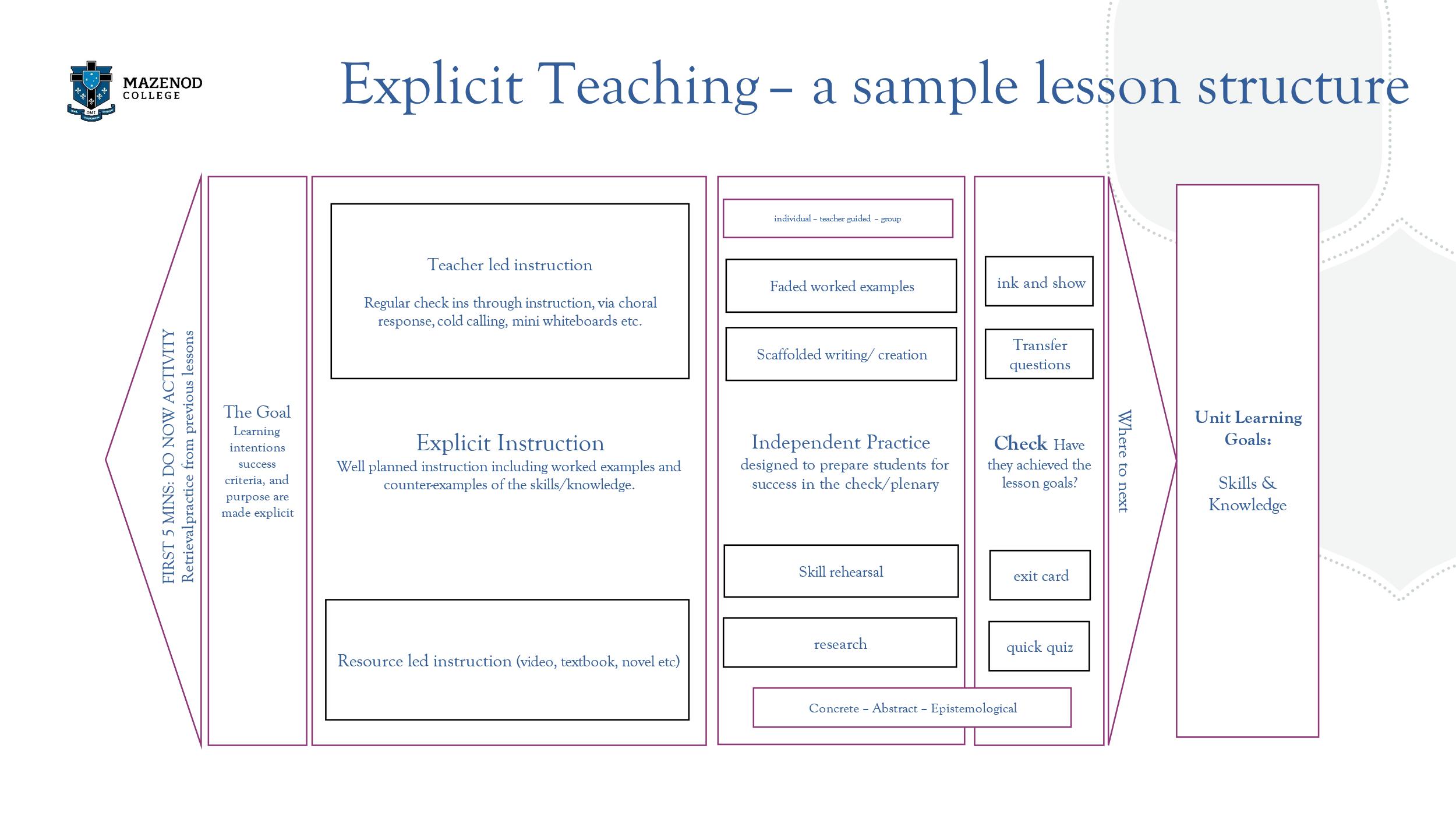
All subjects at every year level are governed by Course Outlines or planning documents of which each student should have access via the College Learning Management System, MazCom. These documents are located on MazCom and provide a description of the course and outline course requirements and learning outcomes.
Exams are held at the end of Semesters 1 and 2 for all students. For students in Years 11 and 12, there is a detailed VCE Policy for successful completion and attendance.
Apart from the Course Outlines that are given to students via MazCom, each assessment task should be introduced by way of a criteria sheet. This outlines the requirements for the task and sets out the criteria by which grades will be awarded. Letter grades or percentages are allocated to assessment tasks at these year levels, based on the performance of the students according to these criteria or on a rubric or a marking scheme.
Most subjects award very high to very low for each criterion, with each having a numerical value (eg. very high is five and very low is one). The total scores are then compared to a pre-determined scale for grades, and the grade consequently arrived at. Grades range from A+ to E and a UG is awarded when a piece of work fails to meet the minimum required for an E. There is a Late Work Policy on MazCom for Years 7-10.
In Year 11 the Course Outline should also be used to indicate to students the minimum requirements for an ‘S’ for a VCE unit. Failure to submit any part of the requirements by the last day of the semester, as declared in the diary, will result in that student receiving an ‘N’. ‘S’ or ‘N’ does not apply to Years 7-10. Contact with parents of students who fail to submit work, or meet deadlines is required, and this communication is shared with the Year Level Leader.
Course Outlines should also be used with Year 12 and VCAA procedures and practices must be followed. All Year 12 students complete formal examinations.
All students are expected to undertake their studies to the best of their ability, both in class and at home. This includes completion of all set work including assessment tasks. Students are expected to follow the guidelines, stages and timeline provided by teachers for the completion of work and assessment tasks.
Should a student fail to complete classwork or homework or should they fail to make progress on extended assessment tasks, they will be given a warning and a reminder. Teachers will document progress. Further warnings result in possible lunchtime detentions. If there is no progress after a week, parents and Year Level Leaders will be notified of the progress concern via an email letter. Further progress concerns result in Thursday or Saturday detentions.
Should a student fail to submit a major assessment task on the due date, a letter of concern will be immediately emailed to parents and Year Level Leaders. Satisfactory explanation is requested. Satisfactory explanation can include school related activities, significant illness or major family activities or emergencies. Students have two further school days to complete the task.
1. If adequate explanation is provided the work will be marked as normal.
2. If no adequate explanation is given students can receive a maximum D+ for their work. Their result is reduced three whole grades (e.g. from A+ to D+)
3. If the task is not submitted within the two days allowed teachers will give an N grade for the task and notify the Year Level Leader to arrange a Thursday or Saturday detention. The task must still be completed.
4. If the task continues to be unfinished further detentions may result and a parent meeting will be organised.
Homework is considered to be an integral part of the teaching and learning program, supports the development of sound study attitudes and habits and is considered valuable for developing an individual sense of responsibility and self-discipline.
The school believes that homework serves a number of purposes including:
• Developing positive study habits and subject working skills
• Reinforcing and enriching work undertaken in class
• Providing parents with an insight into the work covered at school and providing feedback to teachers
• Preparation for assessment tasks and exams
The homework guidelines vary from year to year, gradually increasing from Years 7 to 12. Ranges are indicated to allow for individual differences and some increase during the year and at exam time.
Individual students have different patterns each week depending on other commitments and may complete fewer sessions with slightly more time or vice versa.
Homework should be noted in students’ diaries and regularly monitored. Time guidelines include school related reading and other activities.
Homework activities include: set homework, research, reading, spelling, language practice, assignments and assessment tasks, revision, exam preparation, exam and assessment task practice. There is no such thing as ‘no homework’. Starting in Year 9, one (and later two) weekend sessions should include some regular revision, summarising and exam preparation.
A weekly homework/study timetable can be a great help to many students, and can be a brief overview or outline of the week or a more detailed breakdown of the students’ use of the available study time, depending on the needs of the individual student. Pastoral Leaders can assist in the preparation of a homework timetable.
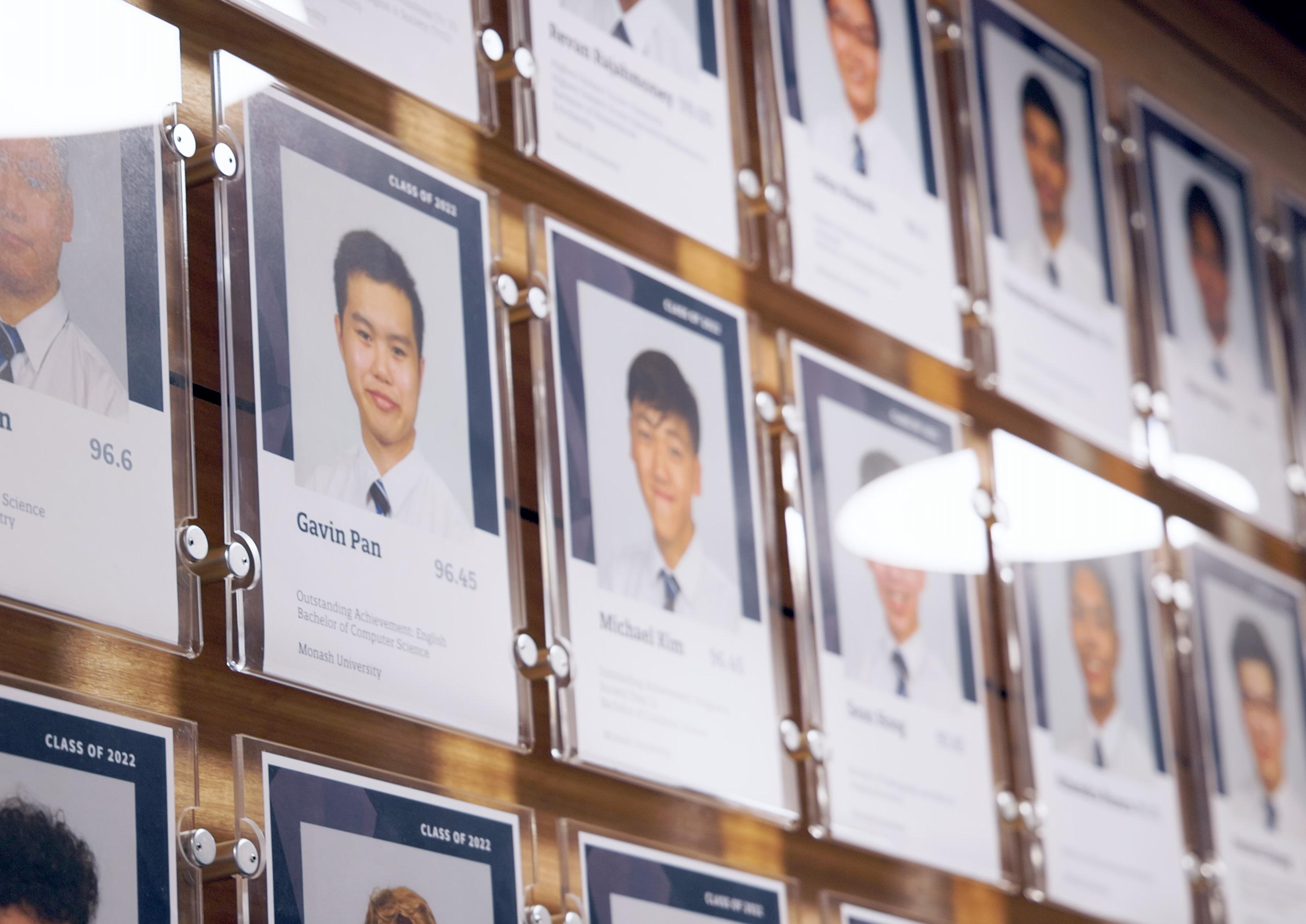
The VCE is awarded solely on the basis of satisfactory completion of units. To satisfactory complete each unit a student must demonstrate achievement of each of the Outcomes for that unit. This is done only through completion of designated assessment tasks.
Achievement of an Outcome means:
• The assessment task work meets the required standard
• The assessment task work was submitted on time
• The assessment task work is clearly the student’s own work
• There has been no substantive breach of rules
If all outcomes are achieved, the student will receive an S for the unit.
There are two types of tasks used to assess achievement of Outcomes:
1. SACs (Assessment completed in class time). The majority of assessments in the VCE are completed in class time. They must be handed up at the end of the scheduled class time. Attendance at these assessments is therefore crucial to a student’s success. In the case of absence from a SAC the following rules apply:
• If the absence is school approved (medical certificate, family emergency, unavoidable school related approved by Principal), the student will have the SAC rescheduled and it will be scored. In some cases when the SAC cannot be rescheduled the student will be given an estimated score.
• If the absence is not approved, the student will have the SAC or a similar SAC or some other work rescheduled as soon as possible. This will NOT be scored. It will be graded NA but must be completed in order for the student to demonstrate achievement of the Outcome.
2. SATs (Assessment tasks completed in class and at home).
Some assessment tasks are completed over longer periods of time, including at home, with a final due date.
Final submission of these assessments on the due date is therefore crucial to a student’s success. In the case of non-submission on the due date the following rules apply:
• Students may apply for an extension of up to 2 days.
• Applications MUST be made prior to the due date. Applications are made on a form obtained from their Year Level Leader. Possible reasons for granting of an extension would include school approved absence.
• If no extension application or approved absence, the student must submit their work ON THE DUE DATE even if incomplete. No further work submitted after this will be scored.
Once a student has completed the SAC work or submitted the extended task, the teacher will assess the work and determine whether the student has demonstrated achievement of the relevant outcome(s). If they have not, they will receive a written ‘N Warning’ letter (also sent to parents). Students will be given one further opportunity to demonstrate achievement of the outcome. This could be re-sitting the same SAC or a different SAC, completing additional work on the same task, completing extra work at school or at home, attending an interview, etc. The teacher determines the appropriate time frame for this – typically within 7 days. This will NOT be scored, but must be completed in order for the student to demonstrate achievement of the Outcome.
If students still do not demonstrate achievement of the outcome, they will receive written notification of a ‘Provisional N’ for that unit (also sent to parents). The unit failure (N) is provisionally awarded, however:
• Students may have the ‘Provisional N’ redeemed with appropriate behaviour and completion of all work during the semester, and/or demonstration of improved understanding on the final exam.
• Students may have the unit failure (N) awarded at the end of the semester if they demonstrate no improvement or with further unsatisfactory or incomplete work in that semester.
All outstanding class work, homework and assessment task work must be submitted by the final semester date as published in the diary. Final decisions regarding the awarding of N are made after this.
Students are expected to attend sufficient class time to complete work. This is considered to be at least 90% of all lessons in each subject. Attendance is monitored each lesson and reported to parents. Whenever a student knows they will be absent from class for any reason he should notify his subject teachers prior to the date.
1. After a student has missed 8 lessons for any reason (doubles = 2 lessons), students receive a verbal warning from their teacher or Year Level Leader. More than 20 minutes late counts as an absence.
2. Further absences must all be ‘approved’ as one of the following:
• Unavoidable school related absence (sports, choir, excursions etc.)
• Medical absence with a certificate
• Genuine family emergency (parents notify Year Level Leader)
3. After the next non-approved absence students receive a written ‘N Warning’ (sent to parents)
4. With further non-approved absence, students are in danger of receiving written notification of a ‘Provisional N’ for that unit (sent to parents). The unit failure (N) is provisionally awarded, however:
• Students may have the ‘Provisional N’ redeemed with NO further non-approved absence in that semester and appropriate behaviour and completion of work
• Students may have the unit failure (N) awarded at the end of the semester with further non-approved absence in that semester, inappropriate behaviour or non-completion of work
• All students have the right to complete their studies in the best possible learning environment
• All students are expected to take thorough notes and participate fully in class activities
• All students are expected to complete all designated homework to the best of their ability
Students who behave in class in ways that disrupt other students learning or who do not complete designated work may:
• Receive a verbal warning from their teacher and Year Level Leader, and parents are informed by phone
• Receive a progress concern letter referring to inappropriate classroom behaviour, completion of homework or class work, deadlines, quality of effort
• Receive a detention to complete work (Thursday or Saturday)
Inappropriate behaviour and non-completion of work will be recorded by teachers and Year Level Leaders, and will be referred to should a student be called to a promotion interview at the end of the year and may be a factor in a student being denied the right to proceed to the next year level.
The full updated Promotion and Pathways Policy can be found on MazCom under Staff Services > Policies & Procedures
In considering the appropriate pathway for a student, Attendance and Achievement will be taken into account with respect to:
• The student’s attendance rate in each subject or unit does not deplete lower than 90% per semester
• The number of subjects or units satisfactorily completed
• The student’s progression in Semester 1 as a point of reference
• The completion of all assessment tasks including examinations with a minimum subject weighted average of 55%
• A demonstrated commitment to complete all tasks within subjects/units
• A positive attitude towards staff, work and a consistent work ethic
• Satisfactory behaviour and a demonstrated willingness to comply with the College rules and expectations
Students who do not meet the requirements for satisfactory completion of subjects will engage in a progress interview with the Dean of the appropriate school (Junior or Senior), and other relevant staff.
At this panel, various options will be discussed, including changing vocational pathways, choosing alternative studies, moving to a reduced load, or changing study habits.
Fundamentally, Mazenod College is proud to offer a wide variety of pathways for young men and choosing the correct one for each student is the focus of this policy.
After 8 non-approved absences = verbal warning
Majority of students sit at scheduled time
Approved absence from SAC so SAC is:
Rescheduled AND Scored
Non-approved absence from SAC so SAC is:
Rescheduled BUT NOT Scored
All SAC work is now assessed against learning outcomes. Any student who has NOT demonstrated outcome:
After next non-approved absence = N warning i
Further non-approved absence = Provisional N and parent interview
N warning and re-sit
Still not satisfactory = Provisional N and parent interview
Approved absence = Supported with medical certificate/family bereavement/court appearance and school sponsored representation or event. The SAC policy also applies to Mazenod College internal mid-year examination and trial examinations.
Majority of students submit on due date
Approved absence or extension (2 days) so SAT is:
Submitted late AND Scored
Late with no approval so SAT is:
Submitted late BUT NOT Scored
All SAT work is now assessed against learning outcomes. Any student who has NOT demonstrated outcome:
N warning and re-submit (up to 7 days)
Still not satisfactory =
Provisional N and parent interview
Approved absence = Supported with medical certificate/family bereavement/court appearance and school sponsored representation or event. The SAT policy also applies to Mazenod College internal mid-year examination and trial examinations.
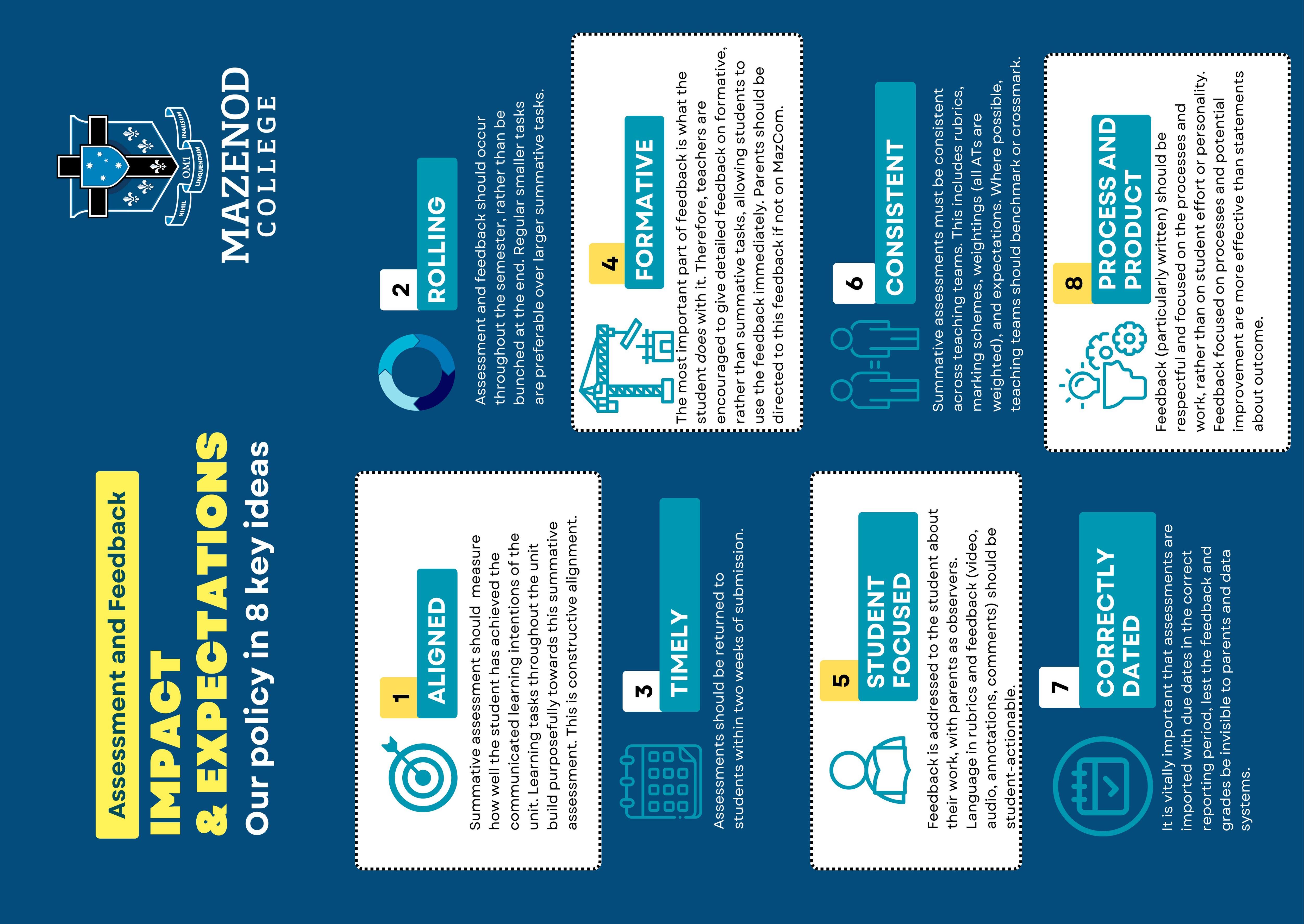
This is a controlled document. Hardcopies of this document are considered uncontrolled. Please refer to MazCom for the latest version.

LEAVE NOTHING UNDARED FOR THE KINGDOM OF GOD